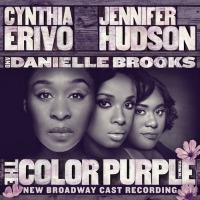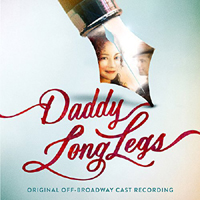 Original Off-Broadway Cast, 2015 (Ghostlight)
Original Off-Broadway Cast, 2015 (Ghostlight)  (3 / 5) In Jean Webster’s 1912 novel Daddy-Long-Legs, Jerusha Abbott is an orphan whose intelligence prompts orphanage trustee Jervis Pendleton to pay for her education. He requests monthly reports on her studies through letters from her, though he has made it clear that he will not reply, remaining anonymous. Ultimately, she discovers he is her roommate’s highly attractive uncle. The novel’s success inspired a play, a 1951 London musical (Love From Judy), and four films. (The Fred Astaire movie Daddy Long Legs is far removed from the original.) The challenge for any adapter is the book’s epistolary style; the reader sees Jerusha’s experiences through her highly personable missives, and falls for her as Jervis does. How to translate a bunch of letters to the stage? The obvious answer is to open up the story, crowding the stage with multiple sets and lots of classmates and friends who are referred to in the book. But John Caird (book) and Paul Gordon (songs) pared their musical to the bare bones: Jerusha, Jervis, and those letters, which comprise most of Jerusha’s songs, performed by Megan McGinnis with a fine sense of developing maturity. The letters are also the indirect source of the songs written for Jervis (Paul Alexander Nolan), as they represent his reactions to them. The greatest strength of the score is the arc of these letter songs. In “Like Other Girls,” Jerusha frets about fitting in, given her humble background, and she bemoans her ignorance of the classics in the delightful “Things I Don’t Know.” Jervis believably moves from reserved philanthropy (“She Thinks I’m Old”) to following Jerusha’s syllabus to wondering “What Does She Mean By Love?” Gordon convincingly explains Jervis’s reluctance to emotional attachments, a key reason why he keeps his identity secret even after meeting Jerusha in person. There are other gems — the sprightly “My Manhattan,” a valentine to New York, and the agonizing “Graduation Day,” when Jerusha’s heart breaks because she thinks her mysterious benefactor is a no-show. (He’s there, of course, and also hurting.) Not everything works. The opening is somewhat mired in exposition, especially Jerusha’s impersonation of another orphan. Jervis’ realization number, “Charity,” lacks the emotional punch it needs, and the finale, “All This Time,” is far too understated; we’re invested in this pair, and we want a bigger payoff. Gordon’s melodies are intimate and sweet, played by piano, cello and guitar. The score is not period, but it fits the property in other respects. A final note: Those who grew up with the novel may wonder why, in the musical, Jerusha doesn’t change her hated first name, foisted on her at the orphanage. Paul Gordon has said he wrote a song for that scene, but it didn’t work well — and also, unlike the character, he and Caird like the name “Jerusha.” — Laura Frankos
(3 / 5) In Jean Webster’s 1912 novel Daddy-Long-Legs, Jerusha Abbott is an orphan whose intelligence prompts orphanage trustee Jervis Pendleton to pay for her education. He requests monthly reports on her studies through letters from her, though he has made it clear that he will not reply, remaining anonymous. Ultimately, she discovers he is her roommate’s highly attractive uncle. The novel’s success inspired a play, a 1951 London musical (Love From Judy), and four films. (The Fred Astaire movie Daddy Long Legs is far removed from the original.) The challenge for any adapter is the book’s epistolary style; the reader sees Jerusha’s experiences through her highly personable missives, and falls for her as Jervis does. How to translate a bunch of letters to the stage? The obvious answer is to open up the story, crowding the stage with multiple sets and lots of classmates and friends who are referred to in the book. But John Caird (book) and Paul Gordon (songs) pared their musical to the bare bones: Jerusha, Jervis, and those letters, which comprise most of Jerusha’s songs, performed by Megan McGinnis with a fine sense of developing maturity. The letters are also the indirect source of the songs written for Jervis (Paul Alexander Nolan), as they represent his reactions to them. The greatest strength of the score is the arc of these letter songs. In “Like Other Girls,” Jerusha frets about fitting in, given her humble background, and she bemoans her ignorance of the classics in the delightful “Things I Don’t Know.” Jervis believably moves from reserved philanthropy (“She Thinks I’m Old”) to following Jerusha’s syllabus to wondering “What Does She Mean By Love?” Gordon convincingly explains Jervis’s reluctance to emotional attachments, a key reason why he keeps his identity secret even after meeting Jerusha in person. There are other gems — the sprightly “My Manhattan,” a valentine to New York, and the agonizing “Graduation Day,” when Jerusha’s heart breaks because she thinks her mysterious benefactor is a no-show. (He’s there, of course, and also hurting.) Not everything works. The opening is somewhat mired in exposition, especially Jerusha’s impersonation of another orphan. Jervis’ realization number, “Charity,” lacks the emotional punch it needs, and the finale, “All This Time,” is far too understated; we’re invested in this pair, and we want a bigger payoff. Gordon’s melodies are intimate and sweet, played by piano, cello and guitar. The score is not period, but it fits the property in other respects. A final note: Those who grew up with the novel may wonder why, in the musical, Jerusha doesn’t change her hated first name, foisted on her at the orphanage. Paul Gordon has said he wrote a song for that scene, but it didn’t work well — and also, unlike the character, he and Caird like the name “Jerusha.” — Laura Frankos
Category Archives: Reviews by Show Name
Adding Machine
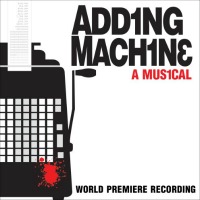 Original Off-Broadway Cast, 2008 (P.S. Classics)
Original Off-Broadway Cast, 2008 (P.S. Classics)  (3 / 5) You might think The Adding Machine, Elmer Rice’s 1923 expressionist drama, an unlikely candidate for musical adaptation. It’s a bleak tale of a bigoted, downtrodden bookkeeper who kills his boss and is executed, ending up in the Elysian Fields, where recycling doesn’t mean reusing plastic bottles. Thankfully, Joshua Schmidt (music and book) and Jason Loewith (book) took on the challenge, and this recording recreates most of the largely sung-through show in all its nerve-jangling dissonance. Joel Hatch is outstanding as the bookkeeper, Mr. Zero — so obnoxious that you know he deserves his fate, yet so thick, you understand how he got that way. Hatch conveys Zero’s character through the staccato snarls of Schmidt and Loewith’s lyrics, full of blunt, monosyllabic statements. The joys in Zero’s life are few, but he relishes them, whether it’s the “Ham and Eggs” his harridan wife (the marvelously caustic Cyrilla Baer) brings for his final meal, or recalling their few moments of wedded bliss in “Didn’t We?” But rage smolders within his confused mind, crowded with endless figures. When his boss crushes his fantasy of promotion (“Movin’ Up”), telling him that he’s being replaced by an adding machine, Zero stabs him. In the afterlife, Zero encounters two souls he knew while alive: his assistant, Daisy (Amy Warren), and fellow inmate Shrdlu (Joe Ferrell). Both get songs that break up the harsh score — a gooey love ditty for Daisy, and a gospel rouser for religious nut Shrdlu, detailing his mother’s murder and the hellish torments he expects for his crime. Most of the score is intentionally jarring; piano, synthesizer, and percussion bang into the brain while the repetitive chorus provides a counterpoint of chanted numbers and echoed lyrics. It’s exactly the right tone for Rice’s piece, though you probably won’t find yourself playing this one often because of the shrillness. — Laura Frankos
(3 / 5) You might think The Adding Machine, Elmer Rice’s 1923 expressionist drama, an unlikely candidate for musical adaptation. It’s a bleak tale of a bigoted, downtrodden bookkeeper who kills his boss and is executed, ending up in the Elysian Fields, where recycling doesn’t mean reusing plastic bottles. Thankfully, Joshua Schmidt (music and book) and Jason Loewith (book) took on the challenge, and this recording recreates most of the largely sung-through show in all its nerve-jangling dissonance. Joel Hatch is outstanding as the bookkeeper, Mr. Zero — so obnoxious that you know he deserves his fate, yet so thick, you understand how he got that way. Hatch conveys Zero’s character through the staccato snarls of Schmidt and Loewith’s lyrics, full of blunt, monosyllabic statements. The joys in Zero’s life are few, but he relishes them, whether it’s the “Ham and Eggs” his harridan wife (the marvelously caustic Cyrilla Baer) brings for his final meal, or recalling their few moments of wedded bliss in “Didn’t We?” But rage smolders within his confused mind, crowded with endless figures. When his boss crushes his fantasy of promotion (“Movin’ Up”), telling him that he’s being replaced by an adding machine, Zero stabs him. In the afterlife, Zero encounters two souls he knew while alive: his assistant, Daisy (Amy Warren), and fellow inmate Shrdlu (Joe Ferrell). Both get songs that break up the harsh score — a gooey love ditty for Daisy, and a gospel rouser for religious nut Shrdlu, detailing his mother’s murder and the hellish torments he expects for his crime. Most of the score is intentionally jarring; piano, synthesizer, and percussion bang into the brain while the repetitive chorus provides a counterpoint of chanted numbers and echoed lyrics. It’s exactly the right tone for Rice’s piece, though you probably won’t find yourself playing this one often because of the shrillness. — Laura Frankos
An American in Paris
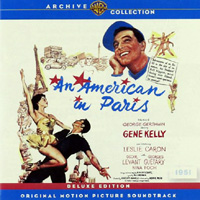 Film Soundtrack, 1951 (MGM/Rhino-Turner/Watertower Music)
Film Soundtrack, 1951 (MGM/Rhino-Turner/Watertower Music)  (5 / 5) In the 1990s, Turner Entertainment restored one of MGM’s greatest musicals, An American In Paris. The restoration turned up the studio session tapes of the all-Gershwin score, which led to Turner teaming with Rhino Records to release a two-disc album stuffed full of the music heard in the film as well as outtakes, underscoring, and extended and alternate versions of songs. That 1996 CD is now out of print, but in 2015, Watertower Music made it available digitally through their Warner Archives series. The songs in the film, nearly all part of the Great American Songbook, are performed by an engaging trio: Gene Kelly as Jerry Mulligan, a war vet and aspiring painter; Oscar Levant as Adam Cook, an acerbic composer; and Georges Guetary as Henri Baurel, a song-and-dance man. Kelly is at his charming best teaching English to a gaggle of Parisian kids through “I Got Rhythm” and earnestly expressing his passion for Leslie Caron in “Love Is Here To Stay.” He joins Guetary in proclaiming the joys of love (for the same girl, though they don’t know it) in “‘S Wonderful,” and goofs with Levant on “Tra-la-la.” Guetary solos in a “(I’ll Build A) Stairway To Paradise,” so rousing that you expect showgirls to parade through your room. The soundtrack is capped by the MGM Studio Orchestra, up-sized to 72 players and conducted by Johnny Green, performing the glorious 16-minute “An American In Paris Ballet.” Added material includes underscoring and medleys by the studio orchestra and Benny Green and his band, along with outtakes such as Kelly’s heartfelt “I’ve Got a Crush On You” and an incredible set of Gershwin improvisations by Levant, who was a lifelong friend of Gershwin and one of his finest interpreters. The improvs got deleted from the film in favor of another treasure, Levant’s brilliant — and in the film, highly comic — rendition of the “Concerto in F (Third Movement).” This is one of the two pieces in stereo on the album; if this album has any drawbacks, it’s the fact that most of the session tapes didn’t survive in multi-channel format, so almost all of the music is presented here in mono. But that’s a quibble. It all adds up to nearly two hours of pure Gershwin(s), and as Ira wrote, “Who could ask for anything more?” —Laura Frankos
(5 / 5) In the 1990s, Turner Entertainment restored one of MGM’s greatest musicals, An American In Paris. The restoration turned up the studio session tapes of the all-Gershwin score, which led to Turner teaming with Rhino Records to release a two-disc album stuffed full of the music heard in the film as well as outtakes, underscoring, and extended and alternate versions of songs. That 1996 CD is now out of print, but in 2015, Watertower Music made it available digitally through their Warner Archives series. The songs in the film, nearly all part of the Great American Songbook, are performed by an engaging trio: Gene Kelly as Jerry Mulligan, a war vet and aspiring painter; Oscar Levant as Adam Cook, an acerbic composer; and Georges Guetary as Henri Baurel, a song-and-dance man. Kelly is at his charming best teaching English to a gaggle of Parisian kids through “I Got Rhythm” and earnestly expressing his passion for Leslie Caron in “Love Is Here To Stay.” He joins Guetary in proclaiming the joys of love (for the same girl, though they don’t know it) in “‘S Wonderful,” and goofs with Levant on “Tra-la-la.” Guetary solos in a “(I’ll Build A) Stairway To Paradise,” so rousing that you expect showgirls to parade through your room. The soundtrack is capped by the MGM Studio Orchestra, up-sized to 72 players and conducted by Johnny Green, performing the glorious 16-minute “An American In Paris Ballet.” Added material includes underscoring and medleys by the studio orchestra and Benny Green and his band, along with outtakes such as Kelly’s heartfelt “I’ve Got a Crush On You” and an incredible set of Gershwin improvisations by Levant, who was a lifelong friend of Gershwin and one of his finest interpreters. The improvs got deleted from the film in favor of another treasure, Levant’s brilliant — and in the film, highly comic — rendition of the “Concerto in F (Third Movement).” This is one of the two pieces in stereo on the album; if this album has any drawbacks, it’s the fact that most of the session tapes didn’t survive in multi-channel format, so almost all of the music is presented here in mono. But that’s a quibble. It all adds up to nearly two hours of pure Gershwin(s), and as Ira wrote, “Who could ask for anything more?” —Laura Frankos
 Original Broadway Cast, 2015 (Sony Masterworks Broadway)
Original Broadway Cast, 2015 (Sony Masterworks Broadway)  (4 / 5) Some Gershwin fans may have been wary when they heard of plans to turn the beloved film An American in Paris into a stage musical, filled out with other numbers by George and Ira. Previous attempts to create “new” Gershwin shows through similar methods had had decidedly mixed results; just look at My One And Only, Crazy For You, and Nice Work If You Can Get It. (On second thought, please don’t look at Nice Work If You Can Get It.) But in this case, the outcome was far better. Librettist Craig Lucas, director Christopher Wheeldon, and musical supervisor/arranger Rob Fisher crafted a show that takes its inspiration from the film but wisely doesn’t try to replicate it. Only five numbers — the “Concerto in F,” “I Got Rhythm,” “‘S Wonderful,” “Stairway to Paradise,” and the title ballet — are in both the movie and the show, and the interpolations were chosen with an eye toward how well they fit the plot and characters. In the stage musical, the time of the action is shifted to the immediate post-WWII years, with Paris recovering both spiritually and physically. That’s clear in the first ensemble number, “I Got Rhythm,” when Henri Baurel (Max von Essen) tells composer Adam Hochberg (Brandon Uranowitz), “People need to laugh. Paris needs it.” By the song’s end, Henri has brought a snappy 4/4 beat to Adam’s dirge-like melody, and the pair have become fast friends with another fellow vet, painter Jerry Mulligan (Robert Fairchild). Enter Lise Dassin (Leanne Cope), a young ballerina destined to become the love object of all three men — another departure from the film. It’s a nice touch, making Adam much more than comic relief, and Uranowitz’s heartbreaking take on “But Not For Me” is one of the cast recording’s highlights. The full trio of male leads also provides lovely harmonies, both joyful (“‘S Wonderful”) and poignant (the 11 o’clocker “They Can’t Take That Away From Me”). Fairchild has an engaging warmth that’s most evident in “I’ve Got Beginner’s Luck” and “Liza” but also comes through in the bits of dialogue on the recording. In the film, the female roles of Lise and Jerry’s patroness, Milo, don’t get any vocals, but that’s not the case here. Cope gives us a yearning “The Man I Love” and pairs well with Fairchild on one of the Gershwins’ sweetest ballads, “For You, For Me, For Evermore.” Jill Paice, as Milo, provides sophistication and sultriness in “Shall We Dance?” and a glimpse into her heart in “But Not For Me.” As in the film, it’s the concert pieces that really complete the whole, beautifully orchestrated here by Christopher Austin; the title ballet and the “Concerto in F” (the show’s opening) are joined by the “Second Prelude” and the first act finale, which includes the “Second Rhapsody” and the “Cuban Overture.” This cast album doesn’t replace the soundtrack, but it’s not meant to. It has its own merits. — L.F.
(4 / 5) Some Gershwin fans may have been wary when they heard of plans to turn the beloved film An American in Paris into a stage musical, filled out with other numbers by George and Ira. Previous attempts to create “new” Gershwin shows through similar methods had had decidedly mixed results; just look at My One And Only, Crazy For You, and Nice Work If You Can Get It. (On second thought, please don’t look at Nice Work If You Can Get It.) But in this case, the outcome was far better. Librettist Craig Lucas, director Christopher Wheeldon, and musical supervisor/arranger Rob Fisher crafted a show that takes its inspiration from the film but wisely doesn’t try to replicate it. Only five numbers — the “Concerto in F,” “I Got Rhythm,” “‘S Wonderful,” “Stairway to Paradise,” and the title ballet — are in both the movie and the show, and the interpolations were chosen with an eye toward how well they fit the plot and characters. In the stage musical, the time of the action is shifted to the immediate post-WWII years, with Paris recovering both spiritually and physically. That’s clear in the first ensemble number, “I Got Rhythm,” when Henri Baurel (Max von Essen) tells composer Adam Hochberg (Brandon Uranowitz), “People need to laugh. Paris needs it.” By the song’s end, Henri has brought a snappy 4/4 beat to Adam’s dirge-like melody, and the pair have become fast friends with another fellow vet, painter Jerry Mulligan (Robert Fairchild). Enter Lise Dassin (Leanne Cope), a young ballerina destined to become the love object of all three men — another departure from the film. It’s a nice touch, making Adam much more than comic relief, and Uranowitz’s heartbreaking take on “But Not For Me” is one of the cast recording’s highlights. The full trio of male leads also provides lovely harmonies, both joyful (“‘S Wonderful”) and poignant (the 11 o’clocker “They Can’t Take That Away From Me”). Fairchild has an engaging warmth that’s most evident in “I’ve Got Beginner’s Luck” and “Liza” but also comes through in the bits of dialogue on the recording. In the film, the female roles of Lise and Jerry’s patroness, Milo, don’t get any vocals, but that’s not the case here. Cope gives us a yearning “The Man I Love” and pairs well with Fairchild on one of the Gershwins’ sweetest ballads, “For You, For Me, For Evermore.” Jill Paice, as Milo, provides sophistication and sultriness in “Shall We Dance?” and a glimpse into her heart in “But Not For Me.” As in the film, it’s the concert pieces that really complete the whole, beautifully orchestrated here by Christopher Austin; the title ballet and the “Concerto in F” (the show’s opening) are joined by the “Second Prelude” and the first act finale, which includes the “Second Rhapsody” and the “Cuban Overture.” This cast album doesn’t replace the soundtrack, but it’s not meant to. It has its own merits. — L.F.
American Psycho
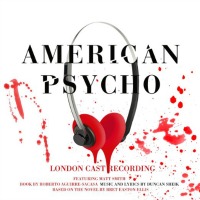 Original London Cast, 2016 (Concord Records)
Original London Cast, 2016 (Concord Records)  (4 / 5) Duncan Sheik’s score for this musical adaptation of Bret Easton Ellis’ savage (in all senses of the word), satiric novel marvelously captures the musical vibe of the go-go 1980s, when “greed was good.” It helps that interpolated into the show’s score are some of the decade’s big hits — for example, Tears for Fears’ “Everybody Wants to Rule the World,” Phil Collins’ “In the Air Tonight” — which have been terrifically re-conceived for a theatrical storytelling mode. What’s not always so successful is Sheik’s attempt to capture the book’s biting humor. In certain numbers (“You Are What You Wear,”) his work as lyricist zings, communicating the characters’ sense of entitlement while also commenting on their vapidity. Other songs — like “Mistletoe Alert” which attempts a similar dual purpose — fall flat on this original London cast recording, without the visuals that audiences encountered in the theater. As a record of the musical, the album provides an intriguing glimpse of it “in process.” Before American Psycho transferred from London to Broadway, new numbers were written and the song order was changed; for those who saw the show during its brief run in New York, it’s fascinating to listen to this OLCR and hear how the narrative became more direct in the journey across the Atlantic. (Roberto Aguirre-Sacasa wrote the book for the musical.) In the unlikely event that a Broadway cast recording is ever released, it will probably overshadow this one, thanks to the changes and Benjamin Walker’s electrifying performance as Patrick Bateman. Until then, this album will have to suffice, and listeners will find that Sheik’s energetic melodies seem to demand repeated plays. — Andy Propst
(4 / 5) Duncan Sheik’s score for this musical adaptation of Bret Easton Ellis’ savage (in all senses of the word), satiric novel marvelously captures the musical vibe of the go-go 1980s, when “greed was good.” It helps that interpolated into the show’s score are some of the decade’s big hits — for example, Tears for Fears’ “Everybody Wants to Rule the World,” Phil Collins’ “In the Air Tonight” — which have been terrifically re-conceived for a theatrical storytelling mode. What’s not always so successful is Sheik’s attempt to capture the book’s biting humor. In certain numbers (“You Are What You Wear,”) his work as lyricist zings, communicating the characters’ sense of entitlement while also commenting on their vapidity. Other songs — like “Mistletoe Alert” which attempts a similar dual purpose — fall flat on this original London cast recording, without the visuals that audiences encountered in the theater. As a record of the musical, the album provides an intriguing glimpse of it “in process.” Before American Psycho transferred from London to Broadway, new numbers were written and the song order was changed; for those who saw the show during its brief run in New York, it’s fascinating to listen to this OLCR and hear how the narrative became more direct in the journey across the Atlantic. (Roberto Aguirre-Sacasa wrote the book for the musical.) In the unlikely event that a Broadway cast recording is ever released, it will probably overshadow this one, thanks to the changes and Benjamin Walker’s electrifying performance as Patrick Bateman. Until then, this album will have to suffice, and listeners will find that Sheik’s energetic melodies seem to demand repeated plays. — Andy Propst
A Gentleman’s Guide to Love and Murder
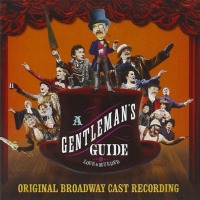 Original Broadway Cast, 2014 (Ghostlight)
Original Broadway Cast, 2014 (Ghostlight)  (3 / 5) Based on a novel by Roy Horniman that also inspired the film Kind Hearts and Coronets (1949), A Gentleman’s Guide to Love and Murder is pure wit and charm, but at a slight cost. The musical tells of an English Everyman, Monty Navarro, who discovers that he’s an heir to the prestigious D’Ysquith family’s fortune and then schemes to bump off each member of the family who stands in the line of succession before him. Though this may sound like nasty stuff, songwriters Robert L Freedman and Steven Lutvak present the story in a highly affected, proper-British, light-operetta manner: Agatha Christie meets Gilbert and Sullivan meets Oscar Wilde. They succeeded in making a fun and clever musical, one for which Lutvak composed many hummable melodies and, with Freedman, some exceptionally witty lyrics. Yet the cast album is a bit of a slow burn for the listener; early songs such as “You’re a D’ysquith” and “Foolish to Think” demonstrate Lutvak and Freedman’s difficulty in creating a strong narrative structure for much of the show’s first act. But as Monty (here played with dewy innocence by Bryce Pinkham) gains more confidence with his schemes, so does the show, and by the time we get to the door-slamming farce “I’ve Decided to Marry You” in Act Two, A Gentleman’s Guide to Love and Murder has risen from commendably intelligent to wonderfully hilarious. The recording boasts a stellar cast: Pinkham glides easily through the score with his silken voice, Lisa O’Hare is perfect as the shallow Sibella, and Lauren Worsham brings operatic flair to the role of the goodhearted Phoebe. Best of all is Jefferson Mays, clearly having a ball playing all eight moribund members of the D’Ysquith family. (This device was carried over from Kind Hearts and Coronets, in which Alec Guinness plays the victims.) With sophisticated yet daffy orchestrations by Jonathan Tunick to boot, this album offers a great deal of fun to any musical theater fan who’s willing to put in the time and listen through to the end. — Matt Koplik
(3 / 5) Based on a novel by Roy Horniman that also inspired the film Kind Hearts and Coronets (1949), A Gentleman’s Guide to Love and Murder is pure wit and charm, but at a slight cost. The musical tells of an English Everyman, Monty Navarro, who discovers that he’s an heir to the prestigious D’Ysquith family’s fortune and then schemes to bump off each member of the family who stands in the line of succession before him. Though this may sound like nasty stuff, songwriters Robert L Freedman and Steven Lutvak present the story in a highly affected, proper-British, light-operetta manner: Agatha Christie meets Gilbert and Sullivan meets Oscar Wilde. They succeeded in making a fun and clever musical, one for which Lutvak composed many hummable melodies and, with Freedman, some exceptionally witty lyrics. Yet the cast album is a bit of a slow burn for the listener; early songs such as “You’re a D’ysquith” and “Foolish to Think” demonstrate Lutvak and Freedman’s difficulty in creating a strong narrative structure for much of the show’s first act. But as Monty (here played with dewy innocence by Bryce Pinkham) gains more confidence with his schemes, so does the show, and by the time we get to the door-slamming farce “I’ve Decided to Marry You” in Act Two, A Gentleman’s Guide to Love and Murder has risen from commendably intelligent to wonderfully hilarious. The recording boasts a stellar cast: Pinkham glides easily through the score with his silken voice, Lisa O’Hare is perfect as the shallow Sibella, and Lauren Worsham brings operatic flair to the role of the goodhearted Phoebe. Best of all is Jefferson Mays, clearly having a ball playing all eight moribund members of the D’Ysquith family. (This device was carried over from Kind Hearts and Coronets, in which Alec Guinness plays the victims.) With sophisticated yet daffy orchestrations by Jonathan Tunick to boot, this album offers a great deal of fun to any musical theater fan who’s willing to put in the time and listen through to the end. — Matt KoplikBilly Elliot
 Original London Cast, 2006 (Decca Broadway)
Original London Cast, 2006 (Decca Broadway)  (2 / 5) Based on the film written by Lee Hall, who did double duty for the stage musical as librettist and lyricist, Billy Elliot tells of a Northern English boy who discovers a love for ballet but has to hide it from his family — including his father and brother, who are on strike with the miner’s union at the height of Thatcherism. A smash hit in London (this cast album represents that production) and on Broadway, Billy Elliot was a moving, theatrically exciting piece due in large part to its thrilling staging by director Stephen Daldry, who also directed the film, and choreographer Peter Darling. What becomes clear on the cast album, however, is the obstacle that Hall and Elton John faced with this project: How does one write a compelling musical theater score when your leading character only feels comfortable expressing himself through dance? Their answer was to create a score that more or less provided a platform for Daldry and Darling to leap from. This is not to say that the songs are bad; they do exactly what they need to do. Without the umbrella of Disney, Elton John produced some inventive melodies (e.g., “Solidarity”) that are given extra character by Martin Koch’s orchestrations, even if John occasionally tends to lean back into his specialty of pop power ballads that don’t quite fit the piece. Hall, a first time lyricist, does an admirable job of keeping the songs in the language of the working class characters. Due to the physical demands of the title role, three young actors rotated as Billy in the original London production (and on Broadway), though only one, Liam Mower, is heard on this recording. Mower does a fine job, as does the rest of the cast, most notably a crackling Hayden Gwynne as the dance teacher who guides Billy out of his shell. Listeners who haven’t seen the show may wonder why Billy Elliot was such a phenomenon; the answer is that this musical, even more than most others, truly needs to be seen to be experienced. — Matt Koplik
(2 / 5) Based on the film written by Lee Hall, who did double duty for the stage musical as librettist and lyricist, Billy Elliot tells of a Northern English boy who discovers a love for ballet but has to hide it from his family — including his father and brother, who are on strike with the miner’s union at the height of Thatcherism. A smash hit in London (this cast album represents that production) and on Broadway, Billy Elliot was a moving, theatrically exciting piece due in large part to its thrilling staging by director Stephen Daldry, who also directed the film, and choreographer Peter Darling. What becomes clear on the cast album, however, is the obstacle that Hall and Elton John faced with this project: How does one write a compelling musical theater score when your leading character only feels comfortable expressing himself through dance? Their answer was to create a score that more or less provided a platform for Daldry and Darling to leap from. This is not to say that the songs are bad; they do exactly what they need to do. Without the umbrella of Disney, Elton John produced some inventive melodies (e.g., “Solidarity”) that are given extra character by Martin Koch’s orchestrations, even if John occasionally tends to lean back into his specialty of pop power ballads that don’t quite fit the piece. Hall, a first time lyricist, does an admirable job of keeping the songs in the language of the working class characters. Due to the physical demands of the title role, three young actors rotated as Billy in the original London production (and on Broadway), though only one, Liam Mower, is heard on this recording. Mower does a fine job, as does the rest of the cast, most notably a crackling Hayden Gwynne as the dance teacher who guides Billy out of his shell. Listeners who haven’t seen the show may wonder why Billy Elliot was such a phenomenon; the answer is that this musical, even more than most others, truly needs to be seen to be experienced. — Matt Koplik
The Drowsy Chaperone
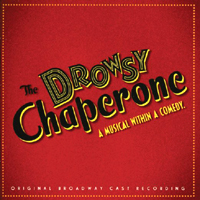 Original Broadway Cast, 2006 (Ghostlight)
Original Broadway Cast, 2006 (Ghostlight)  (3 / 5) This might be the first Broadway musical with commentary written into the script. Alone in his apartment, a musical theater devotee anonymously named Man in Chair plays the recording of one of his favorites, the (fictional) 1920s romp The Drowsy Chaperone. He then proceeds to provide footnotes on the stars and writers as we watch the show come to life in his apartment. On stage, it all worked beautifully and hilariously. With its dynamic original cast and inventive staging, The Drowsy Chaperone was unique in that it allowed those of us who adore musicals to see ourselves depicted on stage, while also giving us the benefit of watching a delightfully silly musical. But when taken out of the frame of the production, the score, by Lisa Lambert and Greg Morrison, proves to be merely decent. Though the songs are cute in their reminiscences of the jazzy musicals of the ’20s, they don’t move beyond hommage. The lyrics can be daffy and quirky (“Show Off”), but they never really channel the wit and sophistication of Lorenz Hart or Ira Gershwin. The music is light but fun, much helped by Larry Blank’s peppy, period appropriate orchestrations. The ensemble, clearly having a blast, revels in old school camp and bravado, and elevates the lyrics so that they seem more humorous than they are. Danny Burstein tastefully hams it up in “I Am Aldolpho,” Beth Leavel gleefully warbles Garland-style in “As We Stumble Along,” and Sutton Foster uses her star power to great effect in “Bride’s Lament.” But it’s co-librettist Bob Martin as the Man in Chair who shines brightest here. Though he has no song of his own, Martin offers anecdotes and opinions on the show within the show and its performers throughout the album. His commentary is hilarious and inventive, delivered with just the right touch of knowledge and enthusiasm. Overall, The Drowsy Chaperone is a highly enjoyable show and a fun album, but to quote the Man in Chair, “just ignore the lyrics.” — Matt Koplik
(3 / 5) This might be the first Broadway musical with commentary written into the script. Alone in his apartment, a musical theater devotee anonymously named Man in Chair plays the recording of one of his favorites, the (fictional) 1920s romp The Drowsy Chaperone. He then proceeds to provide footnotes on the stars and writers as we watch the show come to life in his apartment. On stage, it all worked beautifully and hilariously. With its dynamic original cast and inventive staging, The Drowsy Chaperone was unique in that it allowed those of us who adore musicals to see ourselves depicted on stage, while also giving us the benefit of watching a delightfully silly musical. But when taken out of the frame of the production, the score, by Lisa Lambert and Greg Morrison, proves to be merely decent. Though the songs are cute in their reminiscences of the jazzy musicals of the ’20s, they don’t move beyond hommage. The lyrics can be daffy and quirky (“Show Off”), but they never really channel the wit and sophistication of Lorenz Hart or Ira Gershwin. The music is light but fun, much helped by Larry Blank’s peppy, period appropriate orchestrations. The ensemble, clearly having a blast, revels in old school camp and bravado, and elevates the lyrics so that they seem more humorous than they are. Danny Burstein tastefully hams it up in “I Am Aldolpho,” Beth Leavel gleefully warbles Garland-style in “As We Stumble Along,” and Sutton Foster uses her star power to great effect in “Bride’s Lament.” But it’s co-librettist Bob Martin as the Man in Chair who shines brightest here. Though he has no song of his own, Martin offers anecdotes and opinions on the show within the show and its performers throughout the album. His commentary is hilarious and inventive, delivered with just the right touch of knowledge and enthusiasm. Overall, The Drowsy Chaperone is a highly enjoyable show and a fun album, but to quote the Man in Chair, “just ignore the lyrics.” — Matt Koplik
The Book of Mormon
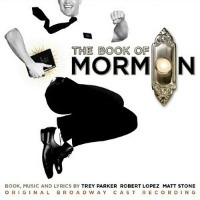 Original Broadway Cast, 2011 (Ghostlight)
Original Broadway Cast, 2011 (Ghostlight)  (4 / 5) When it was announced that the creators of South Park were writing a Broadway musical, with one of the songwriters of Avenue Q, no less, everyone expected that the show was going to be both shocking and hilarious. But the surprise here was that Trey Parker and Matt Stone (South Park) and Robert Lopez (Avenue Q) wrote a stellar musical comedy that was traditional in many ways. Yes, it’s shocking in its profanity and contemporary in its subject matter: two missionaries go to Uganda in the hope of converting villagers to Mormonism. But rather than try to reinvent the wheel with The Book of Mormon, Parker, Stone, and Lopez chose to adhere to tried and true musical theater structure in the style of the Golden Age, and to have fun within it. The cast is strong, each member giving a fully defined, wonderfully well sung performance. Andrew Rannells and Josh Gad, as the two central Mormon characters, make a good team, with Rannells doing the majority of the vocal heavy lifting. Gad is also a strong singer, though his comedic antics can occasionally be grating. Robert Lopez proved with Avenue Q that he has an ear for melody, but here his work is even more inventive while being filled with musical pop culture references to everything from the Osmonds in “All-American Prophet” to The Lion King (a running joke in the show) in “Hasa Diga Eebowai.” Each song has a distinct flavor, and yet the score doesn’t feel disjointed. Stephen Oremus’s orchestrations –played by 23 musicians on the cast album, as compared to nine in the production — match Lopez’s level of invention. As is the case with the best musical comedies, because the score is so reliant on the book, not every song shines as brightly on the recording as it does in the theater (for example, “Making Things Up Again”). But this a minor gripe. The lyrics — by Parker and Stone, with contributions from Lopez — are crass, colorful, and hilarious, yet with a surprising amount of heart. The show wouldn’t have worked if the creators had decided to be condescending to their characters and to the audience, but thankfully, this was not the case. — Matt Koplik
(4 / 5) When it was announced that the creators of South Park were writing a Broadway musical, with one of the songwriters of Avenue Q, no less, everyone expected that the show was going to be both shocking and hilarious. But the surprise here was that Trey Parker and Matt Stone (South Park) and Robert Lopez (Avenue Q) wrote a stellar musical comedy that was traditional in many ways. Yes, it’s shocking in its profanity and contemporary in its subject matter: two missionaries go to Uganda in the hope of converting villagers to Mormonism. But rather than try to reinvent the wheel with The Book of Mormon, Parker, Stone, and Lopez chose to adhere to tried and true musical theater structure in the style of the Golden Age, and to have fun within it. The cast is strong, each member giving a fully defined, wonderfully well sung performance. Andrew Rannells and Josh Gad, as the two central Mormon characters, make a good team, with Rannells doing the majority of the vocal heavy lifting. Gad is also a strong singer, though his comedic antics can occasionally be grating. Robert Lopez proved with Avenue Q that he has an ear for melody, but here his work is even more inventive while being filled with musical pop culture references to everything from the Osmonds in “All-American Prophet” to The Lion King (a running joke in the show) in “Hasa Diga Eebowai.” Each song has a distinct flavor, and yet the score doesn’t feel disjointed. Stephen Oremus’s orchestrations –played by 23 musicians on the cast album, as compared to nine in the production — match Lopez’s level of invention. As is the case with the best musical comedies, because the score is so reliant on the book, not every song shines as brightly on the recording as it does in the theater (for example, “Making Things Up Again”). But this a minor gripe. The lyrics — by Parker and Stone, with contributions from Lopez — are crass, colorful, and hilarious, yet with a surprising amount of heart. The show wouldn’t have worked if the creators had decided to be condescending to their characters and to the audience, but thankfully, this was not the case. — Matt Koplik
The Bridges of Madison County
 Original Broadway Cast, 2014 (Ghostlight)
Original Broadway Cast, 2014 (Ghostlight)  (4 / 5) Robert James Waller’s novel about an Italian war bride’s brief affair with a photographer who passes through her Iowa town became a cultural phenomenon and something of a joke in the mid ’90s. While some were swept up in the romance of the story, others rolled their eyes at the corniness of the dialogue and proceedings. The fact that Jason Robert Brown was able to mine a great deal of musical theater gold from his source material — so much so that he won a Tony Award for his efforts — speaks very well of his craft. In the role of Francesca, the Italian housewife, Kelli O’Hara is in top form on the cast album. She wraps her silvery soprano around Brown’s gorgeous melodies, all the while giving a mature, grounded performance that makes songs like “Almost Real” and “Look at Me” particularly moving. Steven Pasquale is every bit her equal as Robert, the photographer with whom Francesca falls deeply in love; his glorious baritone is rich, strong, and masculine, bringing to mind classic leading men of the Golden Age. Together, these two make the recording essential. Their voices blend to such rapturous effect that their duet “One Second and a Million Miles” is not only the highlight of the whole album, but one of the best love duets written for musical theater in recent years. That said, while the entire score is gorgeous to listen to, the musical loses dramatic steam when Brown and librettist Marsha Norman expand the story to focus on several other characters — and the songs for those characters, though catchy and technically well done, reflect that. The twangy “State Road 21” is a jarring follow up to the wistful “Falling Into You” and is skippable on the album, as are “Something From a Dream” and “Get Closer.” One fine exception is “Another Life,” sung beautifully by Whitney Bashor as Robert’s first wife; the song chronicles the couple’s courtship, marriage, and divorce, and it’s the only one that competes with the songs for Francesca and Robert. Brown’s orchestrations, for which he won another Tony, are lush without being sentimental, and they have a slight country edge. Even with a few substandard songs, Bridges is true romance whenever O’Hara and Pasquale are front and center. — Matt Koplik
(4 / 5) Robert James Waller’s novel about an Italian war bride’s brief affair with a photographer who passes through her Iowa town became a cultural phenomenon and something of a joke in the mid ’90s. While some were swept up in the romance of the story, others rolled their eyes at the corniness of the dialogue and proceedings. The fact that Jason Robert Brown was able to mine a great deal of musical theater gold from his source material — so much so that he won a Tony Award for his efforts — speaks very well of his craft. In the role of Francesca, the Italian housewife, Kelli O’Hara is in top form on the cast album. She wraps her silvery soprano around Brown’s gorgeous melodies, all the while giving a mature, grounded performance that makes songs like “Almost Real” and “Look at Me” particularly moving. Steven Pasquale is every bit her equal as Robert, the photographer with whom Francesca falls deeply in love; his glorious baritone is rich, strong, and masculine, bringing to mind classic leading men of the Golden Age. Together, these two make the recording essential. Their voices blend to such rapturous effect that their duet “One Second and a Million Miles” is not only the highlight of the whole album, but one of the best love duets written for musical theater in recent years. That said, while the entire score is gorgeous to listen to, the musical loses dramatic steam when Brown and librettist Marsha Norman expand the story to focus on several other characters — and the songs for those characters, though catchy and technically well done, reflect that. The twangy “State Road 21” is a jarring follow up to the wistful “Falling Into You” and is skippable on the album, as are “Something From a Dream” and “Get Closer.” One fine exception is “Another Life,” sung beautifully by Whitney Bashor as Robert’s first wife; the song chronicles the couple’s courtship, marriage, and divorce, and it’s the only one that competes with the songs for Francesca and Robert. Brown’s orchestrations, for which he won another Tony, are lush without being sentimental, and they have a slight country edge. Even with a few substandard songs, Bridges is true romance whenever O’Hara and Pasquale are front and center. — Matt Koplik
In the Heights
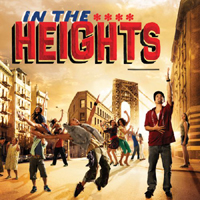 Original Broadway Cast, 2008 (Ghostlight, 2CDs)
Original Broadway Cast, 2008 (Ghostlight, 2CDs)  (4 / 5) Winner of 2008 Tony Awards for Best Musical, Best Original Score, and Best Orchestrations, In the Heights was the first Broadway musical hit to use rap as an essential storytelling component in a score that blends Latin musical styles with hip-hop sensibilities. Set in the Latin-American community of Manhattan’s Washington Heights, the show nestles sentimental stories of first- and second-generation immigrants pursuing their various American dreams and romances amid larger themes concerning notions of home and gentrification. The Grammy Award winning cast album, a two-disc set, preserves the entirety of a dynamic score with both music and lyrics by Lin-Manuel Miranda, who also conceived the show and played the leading role of bodega-owner Usnavi. Fueled by high-octane horns and propulsive percussion, the passion-filled orchestrations by Alex Lacamoire and Bill Sherman support Miranda’s dramatic rapping and the superb singing of the other leads. If you don’t like salsa, merengue, Latin jazz, and hip-hop, you’re out of luck here; but even if the score overall is somewhat lacking in variety, the lengthy individual numbers are built of different-sounding sections. They mix diverse styles, tempi, rhythms, instruments, dynamic levels, and vocal qualities (both spoken and sung), constituting variegated musical journeys unto themselves. Most of the songs also integrate lots of funny, interestingly detailed, and/or emotionally touching dialogue, lending a potent theatricality to what is essentially a pop-music score. Album highlights include “When You’re Home,” a snappy duet performed by Mandy Gonzalez and Christopher Jackson as the show’s young lovers, Nina and Benny; the tear-jerkers “Everything I Know” and “Inutil,” gorgeously sung by Gonzalez and Carlos Gomez, respectively; “Benny’s Dispatch,” a rhythmic treat; and the exciting ensemble number “Carnaval del Barrio.” — Lisa Jo Sagolla
(4 / 5) Winner of 2008 Tony Awards for Best Musical, Best Original Score, and Best Orchestrations, In the Heights was the first Broadway musical hit to use rap as an essential storytelling component in a score that blends Latin musical styles with hip-hop sensibilities. Set in the Latin-American community of Manhattan’s Washington Heights, the show nestles sentimental stories of first- and second-generation immigrants pursuing their various American dreams and romances amid larger themes concerning notions of home and gentrification. The Grammy Award winning cast album, a two-disc set, preserves the entirety of a dynamic score with both music and lyrics by Lin-Manuel Miranda, who also conceived the show and played the leading role of bodega-owner Usnavi. Fueled by high-octane horns and propulsive percussion, the passion-filled orchestrations by Alex Lacamoire and Bill Sherman support Miranda’s dramatic rapping and the superb singing of the other leads. If you don’t like salsa, merengue, Latin jazz, and hip-hop, you’re out of luck here; but even if the score overall is somewhat lacking in variety, the lengthy individual numbers are built of different-sounding sections. They mix diverse styles, tempi, rhythms, instruments, dynamic levels, and vocal qualities (both spoken and sung), constituting variegated musical journeys unto themselves. Most of the songs also integrate lots of funny, interestingly detailed, and/or emotionally touching dialogue, lending a potent theatricality to what is essentially a pop-music score. Album highlights include “When You’re Home,” a snappy duet performed by Mandy Gonzalez and Christopher Jackson as the show’s young lovers, Nina and Benny; the tear-jerkers “Everything I Know” and “Inutil,” gorgeously sung by Gonzalez and Carlos Gomez, respectively; “Benny’s Dispatch,” a rhythmic treat; and the exciting ensemble number “Carnaval del Barrio.” — Lisa Jo Sagolla
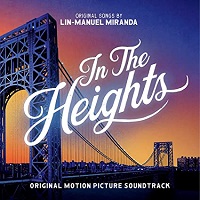 Original Motion Picture Soundtrack, 2021 (Atlantic)
Original Motion Picture Soundtrack, 2021 (Atlantic)  (4 / 5) Retaining the Broadway show’s heart-warming plot lines, likable characters, and Lin-Manuel Miranda’s infectious rap and Latin-pop score, the movie adaptation of In the Heights shifts the focus of the musical’s exploration of “home” from the inter-personal dynamics of a family unit to the larger sense of community shared within their urban neighborhood. The film excises six of the show’s bittersweet, family-related and character-developing solos and duets, and evolves most of the remaining songs into huge production numbers that fill the screen with hordes of dancing bodies. The resulting soundtrack album is, thus, an invigorating collection of mostly upbeat, similarly structured tracks of pop music that may launch quietly but build into full-blown ensemble excitement. Produced by Miranda, Alex Lacamoire, Bill Sherman, and Greg Wells, these percussion-heavy tracks often strike an imperfect balance, volume-wise, between vocals and instrumentals. Unlike the original cast album, with its bright Broadway voices bursting out amid lots of brassy punctuation, here we have thinner pop-style singing competing with louder, fuller orchestrations. One often wishes the words were easier to discern, as the soundtrack CD’s accompanying booklet provides no lyrics. Though shorter than the Broadway recording by about 30 minutes, the soundtrack album contains one newly-written song by Miranda, “Home All Summer.” Featuring the singing of Latin-music superstar Marc Anthony, it exudes a Latin dance-club sensibility as it plays over the film’s closing credits. The soundtrack outshines the Broadway album on two tracks: “The Club,” with electrifying instrumental dance breaks arranged by Oscar Hernández; and “When the Sun Goes Down,” its shimmering orchestrations enriching the ballad’s romantic qualities. Otherwise, one’s choice of the more satisfying album may depend largely on whether one prefers Miranda’s bitingly rhythmic, musically exhilarating rapping or the less-stylized, emotion-laden delivery of Anthony Ramos, who in the film portrays the leading role of Usnavi, created onstage by Miranda. In the climactic “Finale” on the Broadway recording Miranda’s rapping thrills with sharp, spine-tingling musicality, while on the soundtrack, Ramos’s more actorly approach makes one genuinely feel the musical’s celebratory message. — Lisa Jo Sagolla
(4 / 5) Retaining the Broadway show’s heart-warming plot lines, likable characters, and Lin-Manuel Miranda’s infectious rap and Latin-pop score, the movie adaptation of In the Heights shifts the focus of the musical’s exploration of “home” from the inter-personal dynamics of a family unit to the larger sense of community shared within their urban neighborhood. The film excises six of the show’s bittersweet, family-related and character-developing solos and duets, and evolves most of the remaining songs into huge production numbers that fill the screen with hordes of dancing bodies. The resulting soundtrack album is, thus, an invigorating collection of mostly upbeat, similarly structured tracks of pop music that may launch quietly but build into full-blown ensemble excitement. Produced by Miranda, Alex Lacamoire, Bill Sherman, and Greg Wells, these percussion-heavy tracks often strike an imperfect balance, volume-wise, between vocals and instrumentals. Unlike the original cast album, with its bright Broadway voices bursting out amid lots of brassy punctuation, here we have thinner pop-style singing competing with louder, fuller orchestrations. One often wishes the words were easier to discern, as the soundtrack CD’s accompanying booklet provides no lyrics. Though shorter than the Broadway recording by about 30 minutes, the soundtrack album contains one newly-written song by Miranda, “Home All Summer.” Featuring the singing of Latin-music superstar Marc Anthony, it exudes a Latin dance-club sensibility as it plays over the film’s closing credits. The soundtrack outshines the Broadway album on two tracks: “The Club,” with electrifying instrumental dance breaks arranged by Oscar Hernández; and “When the Sun Goes Down,” its shimmering orchestrations enriching the ballad’s romantic qualities. Otherwise, one’s choice of the more satisfying album may depend largely on whether one prefers Miranda’s bitingly rhythmic, musically exhilarating rapping or the less-stylized, emotion-laden delivery of Anthony Ramos, who in the film portrays the leading role of Usnavi, created onstage by Miranda. In the climactic “Finale” on the Broadway recording Miranda’s rapping thrills with sharp, spine-tingling musicality, while on the soundtrack, Ramos’s more actorly approach makes one genuinely feel the musical’s celebratory message. — Lisa Jo Sagolla
Grey Gardens
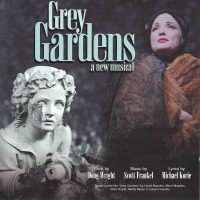 Original Off-Broadway Cast, 2006 (PS Classics)
Original Off-Broadway Cast, 2006 (PS Classics)  (3 / 5) Based on Albert and David Maysles’ fascinating 1975 documentary film of the same name, the musical Grey Gardens depicts the dysfunctional relationship between Edith Bouvier Beale and her daughter, Edie, and the shocking squalor into which they had descended by the mid-1970s. The aunt and cousin of Jacqueline Bouvier Kennedy Onassis, the eccentric, elderly Edith and 56-year-old Edie were discovered residing in a filthy Long Island mansion overrun with cats and wild raccoons. While the musical’s second act takes place in 1973 and replicates much of the film’s ghastly content, the first act is a fictionalized confluence of three real-life events that likely impelled the socialites’ downfall: Edith’s father rebuking her, Joe Kennedy, Jr. inexplicably breaking off his engagement to Edie, and Edith’s husband secretly running off to Mexico to obtain a divorce. Though Christine Ebersole gives a tour-de-force performance in the leading dual role (playing Edith in the first act, Edie in the second), and Doug Wright’s penetrating book is buttressed by well-crafted songs by Scott Frankel and Michael Korie, the original Off-Broadway cast album of Grey Gardens can make for difficult listening. Aside from “Another Winter in a Summer Town,” a poetic ballad, and “The Revolutionary Costume for Today,” an amusing illustration of Edie’s idiosyncratic sense of fashion, the score’s primary attractions are its pastiche evocations of once-popular song genres, ranging from minstrelsy to marches, jazz, soft-shoe, gospel, and those beloved waltz-songs commonly used in musicals as emblems of nostalgia. However, the album also preserves much of the songs’ internal and contextualizing dialogue, most of which is argumentative or otherwise unpleasant and therefore compromises the aesthetic appeal of the music. While it is a representative souvenir of the stage production, this is the kind of album likely to sit on one’s shelf. — Lisa Jo Sagolla
(3 / 5) Based on Albert and David Maysles’ fascinating 1975 documentary film of the same name, the musical Grey Gardens depicts the dysfunctional relationship between Edith Bouvier Beale and her daughter, Edie, and the shocking squalor into which they had descended by the mid-1970s. The aunt and cousin of Jacqueline Bouvier Kennedy Onassis, the eccentric, elderly Edith and 56-year-old Edie were discovered residing in a filthy Long Island mansion overrun with cats and wild raccoons. While the musical’s second act takes place in 1973 and replicates much of the film’s ghastly content, the first act is a fictionalized confluence of three real-life events that likely impelled the socialites’ downfall: Edith’s father rebuking her, Joe Kennedy, Jr. inexplicably breaking off his engagement to Edie, and Edith’s husband secretly running off to Mexico to obtain a divorce. Though Christine Ebersole gives a tour-de-force performance in the leading dual role (playing Edith in the first act, Edie in the second), and Doug Wright’s penetrating book is buttressed by well-crafted songs by Scott Frankel and Michael Korie, the original Off-Broadway cast album of Grey Gardens can make for difficult listening. Aside from “Another Winter in a Summer Town,” a poetic ballad, and “The Revolutionary Costume for Today,” an amusing illustration of Edie’s idiosyncratic sense of fashion, the score’s primary attractions are its pastiche evocations of once-popular song genres, ranging from minstrelsy to marches, jazz, soft-shoe, gospel, and those beloved waltz-songs commonly used in musicals as emblems of nostalgia. However, the album also preserves much of the songs’ internal and contextualizing dialogue, most of which is argumentative or otherwise unpleasant and therefore compromises the aesthetic appeal of the music. While it is a representative souvenir of the stage production, this is the kind of album likely to sit on one’s shelf. — Lisa Jo Sagolla
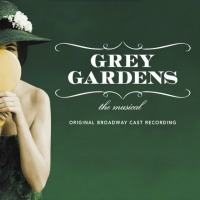 Original Broadway Cast, 2007 (PS Classics)
Original Broadway Cast, 2007 (PS Classics)  (5 / 5) Upon the opening of the Broadway production of Grey Gardens (and the release of the Broadway cast recording), the creative team deemed it the definitive version of their show and requested the discontinuation of the cast album of the original Off-Broadway production, turning that recording into a collector’s item. Considering the musical’s generally grim story about former First Lady Jackie Kennedy’s peculiar aunt and pitiful cousin, Edith and Edie, who wind up living in sickening seediness, the Broadway album is a surprisingly fun listen. In its revamping, the musical lost four of its least inspired songs and gained three shiny new ones. Whereas the Off-Broadway album opens with a scratchy old recording of Edith singing “Toyland” that gets drowned out by the mother and daughter bickering, the Broadway album launches with the newly written “The Girl Who Has Everything,” an optimistic tune set within a conversation of pleasant reminiscing. The new song “Goin’ Places,” sung by Edie and her boyfriend, Joe Kennedy, Jr. (before he jilts her), substitutes a showy jazz number with upbeat lyrics about Joe’s future for Off-Broadway’s “Better Fall Out of Love,” a downer emphasizing why Joe and Edie aren’t right for each other. While the plodding “Tomorrow’s Woman” from Off-Broadway was simply eliminated, the spirited march “Being Bouvier” was re-constituted as “Marry Well,” changing the song from a cold military man’s boasting to warmer-toned advice for young girls from a concerned grandpa. The album also benefits from sparkling new orchestrations by Bruce Coughlin; the only major casting change made for the Broadway transfer, namely the replacement of Sara Gettelfinger by the superior singer Erin Davie as Edie in the first act; and the trimming of the unsettling dialogue that weighed down the Off-Broadway recording, which makes it easier for us to appreciate the humorous aspects of the story of poor, pathetic Edith and Edie. — L.J.S.
(5 / 5) Upon the opening of the Broadway production of Grey Gardens (and the release of the Broadway cast recording), the creative team deemed it the definitive version of their show and requested the discontinuation of the cast album of the original Off-Broadway production, turning that recording into a collector’s item. Considering the musical’s generally grim story about former First Lady Jackie Kennedy’s peculiar aunt and pitiful cousin, Edith and Edie, who wind up living in sickening seediness, the Broadway album is a surprisingly fun listen. In its revamping, the musical lost four of its least inspired songs and gained three shiny new ones. Whereas the Off-Broadway album opens with a scratchy old recording of Edith singing “Toyland” that gets drowned out by the mother and daughter bickering, the Broadway album launches with the newly written “The Girl Who Has Everything,” an optimistic tune set within a conversation of pleasant reminiscing. The new song “Goin’ Places,” sung by Edie and her boyfriend, Joe Kennedy, Jr. (before he jilts her), substitutes a showy jazz number with upbeat lyrics about Joe’s future for Off-Broadway’s “Better Fall Out of Love,” a downer emphasizing why Joe and Edie aren’t right for each other. While the plodding “Tomorrow’s Woman” from Off-Broadway was simply eliminated, the spirited march “Being Bouvier” was re-constituted as “Marry Well,” changing the song from a cold military man’s boasting to warmer-toned advice for young girls from a concerned grandpa. The album also benefits from sparkling new orchestrations by Bruce Coughlin; the only major casting change made for the Broadway transfer, namely the replacement of Sara Gettelfinger by the superior singer Erin Davie as Edie in the first act; and the trimming of the unsettling dialogue that weighed down the Off-Broadway recording, which makes it easier for us to appreciate the humorous aspects of the story of poor, pathetic Edith and Edie. — L.J.S.
Altar Boyz
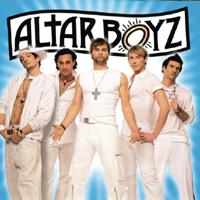 Original Off-Broadway Cast, 2005 (Ghostlight/Sh-K-Boom)
Original Off-Broadway Cast, 2005 (Ghostlight/Sh-K-Boom)  (4 / 5) A boisterous, satirical show in the form of a concert by a Christian pop-rock boy band espousing wholesome morality through their music, Altar Boyz speaks to adolescent worries about being different while pointing out the hypocrisy of those who use religion to discriminate. Via Kevin Del Aguila’s brainy, laugh-a-minute book and clever songs by Gary Adler and Michael Patrick Walker, criticisms are not aimed at specific targets, but are subtly suggested through wise questions and stories containing humorous symbolism. In one of the show’s funniest sequences, the “sensitive” boy in the band tells of getting beat up by “Episcopalian thugs” because he is…“Catholic,” then sings a prideful anthem proclaiming his “epiphany.” The others — a tough homeboy, a Latino, a Jew, and a super-cute jock — also get solo turns that side-splittingly spotlight push-button issues through diverse musical styles. At various points in the score, Jesus’s accomplishments are related rap-style, eternal life is explained to a salsa beat, a gospel sound is used to illuminate one boy’s story of being “called” by Jesus on his cell phone, and a hard-driving funk number insists “you gotta’ work on your soul.” Although the songs sound like pop-rock, they are well crafted as musical theater songs, illuminating characters and creating moods. The lyrics are of the witty, informative theatrical variety, not the numbing, repetitive rock ilk; sung with impeccable diction, they’re easy to discern over the energizing, rock-band instrumentation. This cast album represents skillful songwriting in support of the thematic content of a smart show. – Lisa Jo Sagolla
(4 / 5) A boisterous, satirical show in the form of a concert by a Christian pop-rock boy band espousing wholesome morality through their music, Altar Boyz speaks to adolescent worries about being different while pointing out the hypocrisy of those who use religion to discriminate. Via Kevin Del Aguila’s brainy, laugh-a-minute book and clever songs by Gary Adler and Michael Patrick Walker, criticisms are not aimed at specific targets, but are subtly suggested through wise questions and stories containing humorous symbolism. In one of the show’s funniest sequences, the “sensitive” boy in the band tells of getting beat up by “Episcopalian thugs” because he is…“Catholic,” then sings a prideful anthem proclaiming his “epiphany.” The others — a tough homeboy, a Latino, a Jew, and a super-cute jock — also get solo turns that side-splittingly spotlight push-button issues through diverse musical styles. At various points in the score, Jesus’s accomplishments are related rap-style, eternal life is explained to a salsa beat, a gospel sound is used to illuminate one boy’s story of being “called” by Jesus on his cell phone, and a hard-driving funk number insists “you gotta’ work on your soul.” Although the songs sound like pop-rock, they are well crafted as musical theater songs, illuminating characters and creating moods. The lyrics are of the witty, informative theatrical variety, not the numbing, repetitive rock ilk; sung with impeccable diction, they’re easy to discern over the energizing, rock-band instrumentation. This cast album represents skillful songwriting in support of the thematic content of a smart show. – Lisa Jo Sagolla
All Shook Up
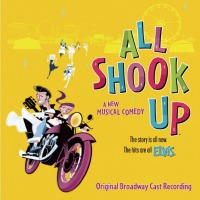 Original Broadway Cast, 2005 (Masterworks Broadway)
Original Broadway Cast, 2005 (Masterworks Broadway)  (2 / 5) A lightweight jukebox musical showcasing 25 songs made famous by Elvis Presley, All Shook Up concerns a motorcycle-riding roustabout who brings romance and rock ‘n’ roll to a dreary Midwestern town in 1955. Flimsily scaffolded by Joe DiPietro’s contrived book, the show contains no original music, thus the value of its cast album lies solely in the degree to which the familiar songs are rendered in new or especially pleasing fashions. Only about a third of the tracks succeed in that respect. The up-tempos fare better than the ballads, most of which are too fast, encumbered by multi-part choral embellishments, and/or robbed of their emotional warmth by strident wailing. The performers don’t try to imitate Elvis, but one almost wishes they could, as it was the velvety beauty of his voice that made Elvis’s renditions of songs like “Love Me Tender” and “Can’t Help Falling in Love” such memorable hits. While none of the cast has a gorgeous enough voice to make those simple melodies as riveting as The King did, Jenn Gambatese (as the roustabout’s love interest, temporarily cross-dressed as a man) gives an impressive interpretation of “A Little Less Conversation,” her bright belt nipping crisply at the rapid-fire lyrics. With arrangements and musical supervision by Stephen Oremus, the album garnishes solo vocals with harmonizing back-up singers and propulsive instrumental breaks, most satisfyingly in “C’mon Everybody,” a “Teddy Bear/Hound Dog” medley, the country-styled “That’s All Right,” and a Motown-flavored “Let Yourself Go.” But the recording’s only true standout numbers are “Jailhouse Rock” and “Burning Love,” classics so intrinsically exciting that they never fail to electrify. — Lisa Jo Sagolla
(2 / 5) A lightweight jukebox musical showcasing 25 songs made famous by Elvis Presley, All Shook Up concerns a motorcycle-riding roustabout who brings romance and rock ‘n’ roll to a dreary Midwestern town in 1955. Flimsily scaffolded by Joe DiPietro’s contrived book, the show contains no original music, thus the value of its cast album lies solely in the degree to which the familiar songs are rendered in new or especially pleasing fashions. Only about a third of the tracks succeed in that respect. The up-tempos fare better than the ballads, most of which are too fast, encumbered by multi-part choral embellishments, and/or robbed of their emotional warmth by strident wailing. The performers don’t try to imitate Elvis, but one almost wishes they could, as it was the velvety beauty of his voice that made Elvis’s renditions of songs like “Love Me Tender” and “Can’t Help Falling in Love” such memorable hits. While none of the cast has a gorgeous enough voice to make those simple melodies as riveting as The King did, Jenn Gambatese (as the roustabout’s love interest, temporarily cross-dressed as a man) gives an impressive interpretation of “A Little Less Conversation,” her bright belt nipping crisply at the rapid-fire lyrics. With arrangements and musical supervision by Stephen Oremus, the album garnishes solo vocals with harmonizing back-up singers and propulsive instrumental breaks, most satisfyingly in “C’mon Everybody,” a “Teddy Bear/Hound Dog” medley, the country-styled “That’s All Right,” and a Motown-flavored “Let Yourself Go.” But the recording’s only true standout numbers are “Jailhouse Rock” and “Burning Love,” classics so intrinsically exciting that they never fail to electrify. — Lisa Jo Sagolla
Dearest Enemy
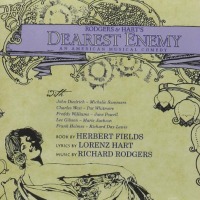 Studio Cast, 1981 (Beginners Records/Bayview)
Studio Cast, 1981 (Beginners Records/Bayview)  (4 / 5) A minor milestone in the history of American musical theater, Dearest Enemy (1925) was the first book show with a score entirely by Richard Rodgers and Lorenz Hart. It was a big success despite its seemingly killjoy subject matter, the American Revolution. Of course, even though George Washington was on hand as one of the characters, the show didn’t really focus on war: Its leading characters are a spunky American girl and a British officer, whose romance has a happy ending. Poised engagingly somewhere between operetta and musical comedy, this “baby-grand opera” was notably more clever than most ’20s shows, with a cheeky and witty book by Herbert Fields and a score that belies its age. “Here in My Arms” and, perhaps, “Bye and Bye” are the only items that gained any lasting popularity, in part because the remainder of the songs are worked so gracefully into the action; there’s a hint of period pastiche in numbers like “Heigh-ho, Lackaday” and “Where the Hudson River Flows.” This London studio recording of the score is flawed only in that the singers are accompanied just by piano and the overture is omitted. The cast boasts no star names — a supporting player named Jane Powell is obviously not the Jane Powell — but everyone is quite on top of the material. In particular, Michelle Summers as Betsy Burke manages to combine modern and archaic vocal styles with effortless charm. A lovely show gets much of its due here. — Richard Barrios
(4 / 5) A minor milestone in the history of American musical theater, Dearest Enemy (1925) was the first book show with a score entirely by Richard Rodgers and Lorenz Hart. It was a big success despite its seemingly killjoy subject matter, the American Revolution. Of course, even though George Washington was on hand as one of the characters, the show didn’t really focus on war: Its leading characters are a spunky American girl and a British officer, whose romance has a happy ending. Poised engagingly somewhere between operetta and musical comedy, this “baby-grand opera” was notably more clever than most ’20s shows, with a cheeky and witty book by Herbert Fields and a score that belies its age. “Here in My Arms” and, perhaps, “Bye and Bye” are the only items that gained any lasting popularity, in part because the remainder of the songs are worked so gracefully into the action; there’s a hint of period pastiche in numbers like “Heigh-ho, Lackaday” and “Where the Hudson River Flows.” This London studio recording of the score is flawed only in that the singers are accompanied just by piano and the overture is omitted. The cast boasts no star names — a supporting player named Jane Powell is obviously not the Jane Powell — but everyone is quite on top of the material. In particular, Michelle Summers as Betsy Burke manages to combine modern and archaic vocal styles with effortless charm. A lovely show gets much of its due here. — Richard Barrios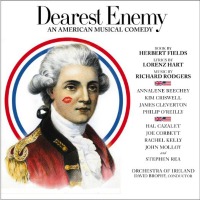 Studio Cast, 2013 (New World Records, 2CDs)
Studio Cast, 2013 (New World Records, 2CDs)  (4 / 5) To anyone wondering why it took nearly nine decades to come up with a complete Dearest Enemy, read the excellent notes that accompany this fine recording. As with so many musicals of an earlier age, even some of the big hits, the parts and orchestrations were either lost or in fragmentary shape. Enter Larry Moore, who reconstructed the score from various extant pieces and, when necessary, found entirely valid ways to bridge the remaining gaps. (At one point, a little Tchaikovsky gets tossed into the mix. Well, why not?) With David Brophy conducting the Orchestra of Ireland and a fine cast, we now have as definitive an Enemy as could be imagined. If it perhaps lacks a bit of the conviction of the earlier British recording, everyone performs with spirit and charm. The orchestra and ensemble sound luscious; Annalene Beechey and James Cleverton are dandy lovers; and Kim Criswell, as Mrs. Murray, manages to keep the excesses at bay and stay in character. Everyone else is equally good, some dialogue is included to give a fair sense of the show, and there’s even a guest star: Stephen Rea, in the spoken role of George Washington. A major work has been stirringly served here, as have Rodgers and Hart and, really, everyone who wants to know about the delights of 1920s musical theater. — R.B.
(4 / 5) To anyone wondering why it took nearly nine decades to come up with a complete Dearest Enemy, read the excellent notes that accompany this fine recording. As with so many musicals of an earlier age, even some of the big hits, the parts and orchestrations were either lost or in fragmentary shape. Enter Larry Moore, who reconstructed the score from various extant pieces and, when necessary, found entirely valid ways to bridge the remaining gaps. (At one point, a little Tchaikovsky gets tossed into the mix. Well, why not?) With David Brophy conducting the Orchestra of Ireland and a fine cast, we now have as definitive an Enemy as could be imagined. If it perhaps lacks a bit of the conviction of the earlier British recording, everyone performs with spirit and charm. The orchestra and ensemble sound luscious; Annalene Beechey and James Cleverton are dandy lovers; and Kim Criswell, as Mrs. Murray, manages to keep the excesses at bay and stay in character. Everyone else is equally good, some dialogue is included to give a fair sense of the show, and there’s even a guest star: Stephen Rea, in the spoken role of George Washington. A major work has been stirringly served here, as have Rodgers and Hart and, really, everyone who wants to know about the delights of 1920s musical theater. — R.B.The Great Waltz
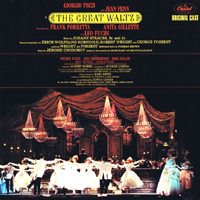 Original West Coast Cast, 1965 (Capitol/no CD)
Original West Coast Cast, 1965 (Capitol/no CD)  (4 / 5) Edwin Lester of the Civic Light Opera Company of Los Angeles and San Francisco was known for bringing Broadway’s first national tours to the West Coast, and for mounting revivals with as many original Broadway cast members as possible. He was also famous for creating and producing such successful “modern” operettas as Song of Norway and Kismet. This show began in Vienna in 1930 as an operetta (Walzer aus Wien) based on the lives and music of Johann Strauss Sr. and Jr. As The Great Waltz, it traveled abroad successfully, then opened on Broadway in a new version in 1934. The credits on this recording reveal the complicated history of the show: music by the two Strausses; musical adaptation by Erich Wolfgang Korngold, Robert Wright, and George Forrest; lyrics by Wright and Forrest; additional lyrics by Forman Brown; book by Jerome Chodorov, based on versions by Moss Hart (1934) and Milton Lazarus (1949). The book of the Lester version involves the father/son conflict that actually existed between Strausses père and fils. The melodies are, of course, ravishing, and the adaptations are scintillatingly orchestrated. Metropolitan Opera stars Giorgio Tozzi (as the elder Strauss) and Jean Fenn (as an opera singer who had a serious flirtation with Strauss in his youth) are wonderful in their respective introductory solos, “I’m in Love With Vienna” and “Philosophy of Life.” And when they raise their voices together in their duets “Of Men and Violins” and “The Enchanted Wood,” they are simply grand. The role of Strauss, Jr. is sung with ringing tenor tone by Frank Porretta; the character has no solos in The Great Waltz, but his duets with Fenn and with Anita Gillette in the ingénue role of Resi are thrilling. Gillette delightfully joins with Wilbur Evans (as Herr Dommayer) in the infectious “A Waltz With Wings.” There is also a fine quartet of conflict for the four principals, “No Two Ways”; a trio titled “Music,” performed with verve by Evans, Leo Fuchs, and Eric Brotherson; and the effective “Blue Danube” finale. — Jeffrey Dunn
(4 / 5) Edwin Lester of the Civic Light Opera Company of Los Angeles and San Francisco was known for bringing Broadway’s first national tours to the West Coast, and for mounting revivals with as many original Broadway cast members as possible. He was also famous for creating and producing such successful “modern” operettas as Song of Norway and Kismet. This show began in Vienna in 1930 as an operetta (Walzer aus Wien) based on the lives and music of Johann Strauss Sr. and Jr. As The Great Waltz, it traveled abroad successfully, then opened on Broadway in a new version in 1934. The credits on this recording reveal the complicated history of the show: music by the two Strausses; musical adaptation by Erich Wolfgang Korngold, Robert Wright, and George Forrest; lyrics by Wright and Forrest; additional lyrics by Forman Brown; book by Jerome Chodorov, based on versions by Moss Hart (1934) and Milton Lazarus (1949). The book of the Lester version involves the father/son conflict that actually existed between Strausses père and fils. The melodies are, of course, ravishing, and the adaptations are scintillatingly orchestrated. Metropolitan Opera stars Giorgio Tozzi (as the elder Strauss) and Jean Fenn (as an opera singer who had a serious flirtation with Strauss in his youth) are wonderful in their respective introductory solos, “I’m in Love With Vienna” and “Philosophy of Life.” And when they raise their voices together in their duets “Of Men and Violins” and “The Enchanted Wood,” they are simply grand. The role of Strauss, Jr. is sung with ringing tenor tone by Frank Porretta; the character has no solos in The Great Waltz, but his duets with Fenn and with Anita Gillette in the ingénue role of Resi are thrilling. Gillette delightfully joins with Wilbur Evans (as Herr Dommayer) in the infectious “A Waltz With Wings.” There is also a fine quartet of conflict for the four principals, “No Two Ways”; a trio titled “Music,” performed with verve by Evans, Leo Fuchs, and Eric Brotherson; and the effective “Blue Danube” finale. — Jeffrey Dunn
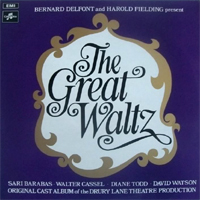 London Cast, 1970 (Columbia/no CD)
London Cast, 1970 (Columbia/no CD)  (2 / 5) Edwin Lester’s Waltz was the impetus for this production at London’s famous Theatre Royal, Drury Lane. With a few textual changes (Julius Bittner is added to the songwriting credits), it ran for 706 performances. The cast album features an overture that’s not included on the earlier recording, and there are other differences in the song stack. Sari Barabas, a genuine European operetta star, exudes Continental flair in a gorgeously sung, heavily accented “I’m in Love With Vienna,” and she could not possibly be more playful or charming in “Teeter-Totter Me” with the sturdy-voiced David Watson as Strauss, Jr. Watson also works well with the Resi of Diane Todd, whose soprano is fluttery yet attractive. As the elder Strauss, Walter Casell displays a huge, mature baritone of great authority. The quartet for the principals gets a little wild, but the finale has Todd and Barabas doing some lovely trilling of the famous “Blue Danube.” — J.D.
(2 / 5) Edwin Lester’s Waltz was the impetus for this production at London’s famous Theatre Royal, Drury Lane. With a few textual changes (Julius Bittner is added to the songwriting credits), it ran for 706 performances. The cast album features an overture that’s not included on the earlier recording, and there are other differences in the song stack. Sari Barabas, a genuine European operetta star, exudes Continental flair in a gorgeously sung, heavily accented “I’m in Love With Vienna,” and she could not possibly be more playful or charming in “Teeter-Totter Me” with the sturdy-voiced David Watson as Strauss, Jr. Watson also works well with the Resi of Diane Todd, whose soprano is fluttery yet attractive. As the elder Strauss, Walter Casell displays a huge, mature baritone of great authority. The quartet for the principals gets a little wild, but the finale has Todd and Barabas doing some lovely trilling of the famous “Blue Danube.” — J.D.
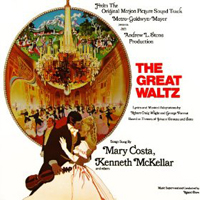 Film Soundtrack, 1972 (MGM/no CD)
Film Soundtrack, 1972 (MGM/no CD)  (4 / 5) Recorded in 1972, this is the soundtrack for a movie that was clearly out of step with the era in which it was created. Still, the film is a very pleasant and artful musical version of the life of Johann Strauss II. As in the other incarnations of The Great Waltz, it uses the melodies of Strauss but adds new lyrics by Wright and Forrest of Kismet and Song Of Norway fame. The big change here is that the lyrics are completely different from those created for the 1937 MGM movie and the 1965 Los Angeles Light Opera production. Many of the songs in the ’72 film were designed to actually narrate a biopic directed by the famously realistic Andrew Stone; others were created to utilize and exploit the singing talents of the beautiful opera star Mary Costa, best known as the voice of Sleeping Beauty in Disney’s animated film. In this way, the film manages to have a sturdy dramatic arc while adding great music and fantastic ballroom sequences choreographed by Onna White. The handsome German actor Horst Bucholz is well cast in the non-singing role of Strauss. The narrative songs here are effectively sung by tenor Kenneth McKellar, and all of the others are realistically presented as on-site performances. Wright & Forrest’s new songs have a greater maturity and sophistication than those heard in previous versions of The Great Waltz; operetta fans may well be enthralled by Costa’s renditions of “Who Are You?” and “Love Is Music.” There is also a small gem called “Say Oui, Say Ya, Say Yes” (performed by Joan Baxter), as lovely and seductive as any operetta number ever written. Sadly, this movie was made about 20 years too late, but today, it can be enjoyed for what it is: a golden example of operetta on film, and a thrilling Strauss cornucopia. The soundtrack album is a must for any operetta fan’s collection — if you can find it. The recording is now quite rare, as it was one of the last issued on the MGM records label as a vinyl LP and has never been released on CD or in any other digital format. — Gerard Alessandrini
(4 / 5) Recorded in 1972, this is the soundtrack for a movie that was clearly out of step with the era in which it was created. Still, the film is a very pleasant and artful musical version of the life of Johann Strauss II. As in the other incarnations of The Great Waltz, it uses the melodies of Strauss but adds new lyrics by Wright and Forrest of Kismet and Song Of Norway fame. The big change here is that the lyrics are completely different from those created for the 1937 MGM movie and the 1965 Los Angeles Light Opera production. Many of the songs in the ’72 film were designed to actually narrate a biopic directed by the famously realistic Andrew Stone; others were created to utilize and exploit the singing talents of the beautiful opera star Mary Costa, best known as the voice of Sleeping Beauty in Disney’s animated film. In this way, the film manages to have a sturdy dramatic arc while adding great music and fantastic ballroom sequences choreographed by Onna White. The handsome German actor Horst Bucholz is well cast in the non-singing role of Strauss. The narrative songs here are effectively sung by tenor Kenneth McKellar, and all of the others are realistically presented as on-site performances. Wright & Forrest’s new songs have a greater maturity and sophistication than those heard in previous versions of The Great Waltz; operetta fans may well be enthralled by Costa’s renditions of “Who Are You?” and “Love Is Music.” There is also a small gem called “Say Oui, Say Ya, Say Yes” (performed by Joan Baxter), as lovely and seductive as any operetta number ever written. Sadly, this movie was made about 20 years too late, but today, it can be enjoyed for what it is: a golden example of operetta on film, and a thrilling Strauss cornucopia. The soundtrack album is a must for any operetta fan’s collection — if you can find it. The recording is now quite rare, as it was one of the last issued on the MGM records label as a vinyl LP and has never been released on CD or in any other digital format. — Gerard Alessandrini
The Color Purple
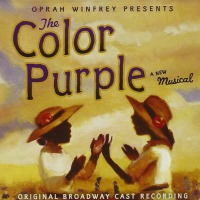 Original Broadway Cast, 2005 (Angel)
Original Broadway Cast, 2005 (Angel)  (3 / 5) Based on the Pulitzer Prize winning novel by Alice Walker, The Color Purple is a work with a lot of heart that was sadly compromised in its original Broadway production by the attempt to present it as a grand, epic musical. Though all of the songwriters are well established in the pop and R&B world, this was the first musical theater score by Brenda Russell, Allee Willis, and Stephen Bray. For the most part, their efforts are worthy. The lyrics are smart and clean, but occasionally heavy handed when leaning towards the poetic. The music, however, is consistently strong, and provides various flavors of jazz, gospel, and soul. LaChanze was given the daunting task of playing Celie, a poor woman who goes through a series of devastating life events, starting the musical at the age of 14 and ending well into her 50s. Acting-wise, the star is up for the task; she wears her heart on her sleeve, and has done the work to specify for the listener what age Celie is at any given moment. However, LaChanze is not always equal to the vocal demands of the score; she’s at her best in the quieter moments (“Our Prayer”), but her two biggest numbers (“What About Love” and “I’m Here”) don’t pack the wallop that they should, because she doesn’t sound completely comfortable from a vocal standpoint. The rest of the cast — including Felicia P. Fields, Elisabeth Withers-Mendes, Renée Elise Goldsberry, and Brandon Victor Dixon — are all vocally gifted, but they perform rather broadly. Too often in this recording, characters come across as caricatures of their literary counterparts, undermining their contribution to Walker’s powerful story. Also, in a rare misstep for Jonathan Tunick, the orchestrations are often busy, seeming to have taken too big a cue from Quincy Jones’s sweeping compositions for the film. This is not a bad score or even a bad recording, but when it’s over, you may be smiling with appreciation rather than wiping away a tear. — Matt Koplik
(3 / 5) Based on the Pulitzer Prize winning novel by Alice Walker, The Color Purple is a work with a lot of heart that was sadly compromised in its original Broadway production by the attempt to present it as a grand, epic musical. Though all of the songwriters are well established in the pop and R&B world, this was the first musical theater score by Brenda Russell, Allee Willis, and Stephen Bray. For the most part, their efforts are worthy. The lyrics are smart and clean, but occasionally heavy handed when leaning towards the poetic. The music, however, is consistently strong, and provides various flavors of jazz, gospel, and soul. LaChanze was given the daunting task of playing Celie, a poor woman who goes through a series of devastating life events, starting the musical at the age of 14 and ending well into her 50s. Acting-wise, the star is up for the task; she wears her heart on her sleeve, and has done the work to specify for the listener what age Celie is at any given moment. However, LaChanze is not always equal to the vocal demands of the score; she’s at her best in the quieter moments (“Our Prayer”), but her two biggest numbers (“What About Love” and “I’m Here”) don’t pack the wallop that they should, because she doesn’t sound completely comfortable from a vocal standpoint. The rest of the cast — including Felicia P. Fields, Elisabeth Withers-Mendes, Renée Elise Goldsberry, and Brandon Victor Dixon — are all vocally gifted, but they perform rather broadly. Too often in this recording, characters come across as caricatures of their literary counterparts, undermining their contribution to Walker’s powerful story. Also, in a rare misstep for Jonathan Tunick, the orchestrations are often busy, seeming to have taken too big a cue from Quincy Jones’s sweeping compositions for the film. This is not a bad score or even a bad recording, but when it’s over, you may be smiling with appreciation rather than wiping away a tear. — Matt KoplikBroadway Cast, 20015 (Broadway Records)  (5 / 5) Well, this is different. In bringing The Color Purple back to Broadway in a stripped down, bare-essentials production, director John Doyle — a master of simplicity — shed a whole new light on the musical and exposed all of its hidden qualities. In terms of the actual material, there’s not much difference between this revival and what was presented 10 years previously; but the approach is vastly different, and that’s why the production and the recording are a revelation. The cast — including TV star Danielle Brooks and Oscar winner Jennifer Hudson, both making their Broadway debuts — finds the humanity that make these characters resonate so deeply. Their powerful acting is reflected in their singing voices, as they attack the score with a ferocity rarely heard on Broadway. While everyone in the cast is stellar, British newcomer Cynthia Erivo is the major find here. Erivo’s Celie may experience brutality and devastation, but she is never a victim. She has strength, humor, and grit; her unstoppable voice can whisper with hurt or soar in triumph, making the 11 o’clock number “I’m Here” the tour de force it was meant to be. Special attention should also be given to the orchestrations of Joseph Joubert, who has removed the fussiness of Jonathan Tunick’s originals and instead has made the orchestra function as a support system (albeit one with great color and versatility), so that the characters are truly front and center. It’s rare for a revival cast recording to be preferable to the original, especially when the revival is significantly smaller in size. But sometimes, with a dynamic cast, a smart director, and a gifted orchestrator, miracles happen. — M.K
(5 / 5) Well, this is different. In bringing The Color Purple back to Broadway in a stripped down, bare-essentials production, director John Doyle — a master of simplicity — shed a whole new light on the musical and exposed all of its hidden qualities. In terms of the actual material, there’s not much difference between this revival and what was presented 10 years previously; but the approach is vastly different, and that’s why the production and the recording are a revelation. The cast — including TV star Danielle Brooks and Oscar winner Jennifer Hudson, both making their Broadway debuts — finds the humanity that make these characters resonate so deeply. Their powerful acting is reflected in their singing voices, as they attack the score with a ferocity rarely heard on Broadway. While everyone in the cast is stellar, British newcomer Cynthia Erivo is the major find here. Erivo’s Celie may experience brutality and devastation, but she is never a victim. She has strength, humor, and grit; her unstoppable voice can whisper with hurt or soar in triumph, making the 11 o’clock number “I’m Here” the tour de force it was meant to be. Special attention should also be given to the orchestrations of Joseph Joubert, who has removed the fussiness of Jonathan Tunick’s originals and instead has made the orchestra function as a support system (albeit one with great color and versatility), so that the characters are truly front and center. It’s rare for a revival cast recording to be preferable to the original, especially when the revival is significantly smaller in size. But sometimes, with a dynamic cast, a smart director, and a gifted orchestrator, miracles happen. — M.K
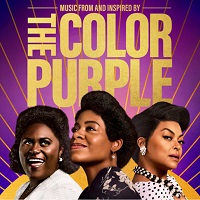 Film Soundtrack, 2023 (WaterTower Music)
Film Soundtrack, 2023 (WaterTower Music)  (2 / 5) News of a movie adaptation of the stage musical version of The Color Purple was met with both cautious optimism and tempered anger. Devoted fans of Spielberg’s original film were confused by what they felt was an unnecessary remake, but after the revelation of the 2016 Broadway revival of the musical, theater fans were eager to see that material brought to the big screen. Unfortunately, more than half of the Broadway score was cut for the movie. Drastic changes to the scores of stage musicals for screen adaptations are nothing new, but the cuts here make very little sense — and what’s worse, the new songs that have replaced the missing ones are painfully inferior. As for the songs that have been kept from the stage show, they have been given new arrangements that are often listenable but rarely compelling. While the cast is jam packed with talent, many of these fantastic performers are underused. For example, Corey Hawkins is a charming and subtly sexy Harpo, but you’ll wish you could hear him sing “Brown Betty” and “Any Little Thing.” And though Halle Bailey, who starred in the live-action remake of Disney’s The Little Mermaid, makes a welcome movie musical return as Nettie, you long to hear her silky voice in “Our Prayer” and “African Homeland” rather than the forgettable “Keep It Movin’.” As Celie, Fantasia Barrino communicates the appropriate amount of pain and resilience, but too much material has been cut for her to make the lasting impression she did when she played this role as a replacement in the original Broadway production of the musical. That said, she does land “I’m Here” well. Danielle Brooks reprises her Broadway revival role of Sofia, and Oscar nominee Taraji P Henson is on hand as Shug Avery. Both bring to their tracks the heat and precision that’s often missing from the rest of this album; Brooks’ “Hell No” might be the best recorded version of that song to date, and Henson’s “Push Da Button” has enough sexual steam to fog up your speakers. When they take command, you get a sense of how great this movie and its soundtrack recording could have been. — M.K.
(2 / 5) News of a movie adaptation of the stage musical version of The Color Purple was met with both cautious optimism and tempered anger. Devoted fans of Spielberg’s original film were confused by what they felt was an unnecessary remake, but after the revelation of the 2016 Broadway revival of the musical, theater fans were eager to see that material brought to the big screen. Unfortunately, more than half of the Broadway score was cut for the movie. Drastic changes to the scores of stage musicals for screen adaptations are nothing new, but the cuts here make very little sense — and what’s worse, the new songs that have replaced the missing ones are painfully inferior. As for the songs that have been kept from the stage show, they have been given new arrangements that are often listenable but rarely compelling. While the cast is jam packed with talent, many of these fantastic performers are underused. For example, Corey Hawkins is a charming and subtly sexy Harpo, but you’ll wish you could hear him sing “Brown Betty” and “Any Little Thing.” And though Halle Bailey, who starred in the live-action remake of Disney’s The Little Mermaid, makes a welcome movie musical return as Nettie, you long to hear her silky voice in “Our Prayer” and “African Homeland” rather than the forgettable “Keep It Movin’.” As Celie, Fantasia Barrino communicates the appropriate amount of pain and resilience, but too much material has been cut for her to make the lasting impression she did when she played this role as a replacement in the original Broadway production of the musical. That said, she does land “I’m Here” well. Danielle Brooks reprises her Broadway revival role of Sofia, and Oscar nominee Taraji P Henson is on hand as Shug Avery. Both bring to their tracks the heat and precision that’s often missing from the rest of this album; Brooks’ “Hell No” might be the best recorded version of that song to date, and Henson’s “Push Da Button” has enough sexual steam to fog up your speakers. When they take command, you get a sense of how great this movie and its soundtrack recording could have been. — M.K.
Heathers
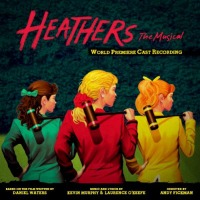 World Premiere Cast, 2014 (Yellow Sound Label)
World Premiere Cast, 2014 (Yellow Sound Label)  (2 / 5) Based on the ’80s cult film of the same title, Heathers is a musical that’s sometimes fun and frothy, though not particularly strong. Writers Laurence O’Keefe (Bat Boy, Legally Blonde) and Kevin Murphy (Reefer Madness) chose a broader, more cartoonish approach to the story than Kevin Waters’ acerbic, razor-sharp screenplay about two teenagers who go to drastic lengths to take down their high school’s hierarchy. While this treatment provides catchy music and a platform for the young, talented cast to display their vocal skills, it removes the bite that made the black-comedy movie so special. The light tone of songs such as “Candy Store” and “Big Fun” demonstrates that the show doesn’t intend to dig deep very often, and though some of the lyrics attempt to go for the film’s humorous shock value, they don’t ring as true as the screenplay’s now-classic dialogue. Only in the quieter moments, the ballads “Seventeen” and “Life Boat,” does the musical truly connect to the movie’s dark heart. As Veronica, originally played by Winona Ryder in the film, Barrett Wilbert Weed provides the most fully formed performance on the album; her dry line delivery and rock-tinged vocals are smart, specific, and thrilling. The orchestrations, by Ben Green and O’Keefe, capture the essence of the ’80s, even if the score mostly doesn’t. Those unfamiliar with the film will likely find this recording fun and entertaining, but hardcore Heathers fans may be disappointed that the chewing tobacco has been replaced by bubble gum. — Matt Koplik
(2 / 5) Based on the ’80s cult film of the same title, Heathers is a musical that’s sometimes fun and frothy, though not particularly strong. Writers Laurence O’Keefe (Bat Boy, Legally Blonde) and Kevin Murphy (Reefer Madness) chose a broader, more cartoonish approach to the story than Kevin Waters’ acerbic, razor-sharp screenplay about two teenagers who go to drastic lengths to take down their high school’s hierarchy. While this treatment provides catchy music and a platform for the young, talented cast to display their vocal skills, it removes the bite that made the black-comedy movie so special. The light tone of songs such as “Candy Store” and “Big Fun” demonstrates that the show doesn’t intend to dig deep very often, and though some of the lyrics attempt to go for the film’s humorous shock value, they don’t ring as true as the screenplay’s now-classic dialogue. Only in the quieter moments, the ballads “Seventeen” and “Life Boat,” does the musical truly connect to the movie’s dark heart. As Veronica, originally played by Winona Ryder in the film, Barrett Wilbert Weed provides the most fully formed performance on the album; her dry line delivery and rock-tinged vocals are smart, specific, and thrilling. The orchestrations, by Ben Green and O’Keefe, capture the essence of the ’80s, even if the score mostly doesn’t. Those unfamiliar with the film will likely find this recording fun and entertaining, but hardcore Heathers fans may be disappointed that the chewing tobacco has been replaced by bubble gum. — Matt KoplikFun Home
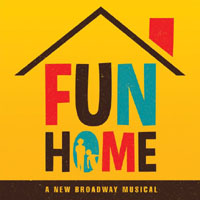 Original Broadway Cast, 2015 (PS Classics)
Original Broadway Cast, 2015 (PS Classics)  (5 / 5) Alison Bechdel’s Fun Home may seem like strange fodder for a Broadway musical. A memoir in the form of a graphic novel, it chronicles Bechdel’s coming out as a lesbian during her freshman year of college — shortly before her father, whom she discovers is a closeted homosexual, commits suicide. But creators Jeanine Tesori, Broadway’s premier female composer, and playwright Lisa Kron, here functioning as both librettist and lyricist, created a dazzling memory musical with a score that is unassuming, yet powerful. The show is narrated by Alison as an adult, played by a grounded Beth Malone; she is struggling to write the memoir as she sorts through her memories, some more vivid than she would like. Flowing in and out of various decades, the songs are variously timely (the faux-’70s-pop “Raincoat of Love”) and timeless (“Telephone Wire,” Bechdel’s recollection of her last moments with her father), all of them beautifully supported by John Clancy’s subtle, elegant orchestrations. Fun Home is a powerful piece that’s given a full, beautiful treatment on the cast recording, thanks to a generous amount of included dialogue. As the doomed father, Bruce, Tony Award winner Michael Cerveris is terrifying and pitiful. Judy Kuhn, as his long suffering wife, Helen, is beautifully restrained in “Days and Days,” a reminiscence of her misused life. Emily Skeggs is adorably awkward as Alison in her college years; but youngster Sydney Lucas, who plays Allison as a child, is the show’s secret weapon. Shedding the stereotype that shadows most child actors, Lucas is mature and strong and in complete control of her performance. Her rendition of “Ring of Keys,” in which a young Alison observes a masculine delivery woman in a diner and experiences her first moment of self-recognition in another person, is the ultimate highlight of the show. That song, like Fun Home as a whole, is destined to become a classic. — Matt Koplik
(5 / 5) Alison Bechdel’s Fun Home may seem like strange fodder for a Broadway musical. A memoir in the form of a graphic novel, it chronicles Bechdel’s coming out as a lesbian during her freshman year of college — shortly before her father, whom she discovers is a closeted homosexual, commits suicide. But creators Jeanine Tesori, Broadway’s premier female composer, and playwright Lisa Kron, here functioning as both librettist and lyricist, created a dazzling memory musical with a score that is unassuming, yet powerful. The show is narrated by Alison as an adult, played by a grounded Beth Malone; she is struggling to write the memoir as she sorts through her memories, some more vivid than she would like. Flowing in and out of various decades, the songs are variously timely (the faux-’70s-pop “Raincoat of Love”) and timeless (“Telephone Wire,” Bechdel’s recollection of her last moments with her father), all of them beautifully supported by John Clancy’s subtle, elegant orchestrations. Fun Home is a powerful piece that’s given a full, beautiful treatment on the cast recording, thanks to a generous amount of included dialogue. As the doomed father, Bruce, Tony Award winner Michael Cerveris is terrifying and pitiful. Judy Kuhn, as his long suffering wife, Helen, is beautifully restrained in “Days and Days,” a reminiscence of her misused life. Emily Skeggs is adorably awkward as Alison in her college years; but youngster Sydney Lucas, who plays Allison as a child, is the show’s secret weapon. Shedding the stereotype that shadows most child actors, Lucas is mature and strong and in complete control of her performance. Her rendition of “Ring of Keys,” in which a young Alison observes a masculine delivery woman in a diner and experiences her first moment of self-recognition in another person, is the ultimate highlight of the show. That song, like Fun Home as a whole, is destined to become a classic. — Matt Koplik
Forbidden Hollywood
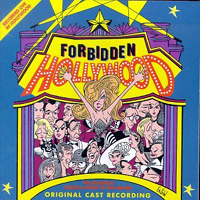 Los Angeles Cast, 1995 (DRG)
Los Angeles Cast, 1995 (DRG)  (3 / 5) Here, Gerard Alessandrini has as much fun with Hollywood excess as with Broadway idiocy. But this recording differs from the Forbidden Broadway albums in one crucial respect: It’s live, and that’s a mistake. The audience keeps howling at sight gags listeners can’t fathom (like Dietrich’s arm falling off in “Falling Apart Again”). The satirical targets are a little strange, too; some numbers aim at movies that were new at the time (Braveheart, Pulp Fiction, Forrest Gump), but nearly half the material clobbers various aspects of decades-old film version of classic Broadway musicals — the color filters in South Pacific, Barbra Streisand’s miscasting in Hello, Dolly! That said, much of it is a riot, and Jason Graae’s impression of Brando singing is as hilarious the twentieth time as the first. Gerry McIntyre is a flawless Louis Armstrong, a funny Whoopi Goldberg, a catatonic Keanu Reeves, and more. Christine Pedi, an unparalleled Liza in several Forbidden Broadways, gets unusually rich material here (“Mein Film Career”). And Suzanne Blakeslee, as Marni Nixon dubbing Audrey Hepburn, does justice to one of the funniest pieces of material Alessandrini has ever written. — Marc Miller
(3 / 5) Here, Gerard Alessandrini has as much fun with Hollywood excess as with Broadway idiocy. But this recording differs from the Forbidden Broadway albums in one crucial respect: It’s live, and that’s a mistake. The audience keeps howling at sight gags listeners can’t fathom (like Dietrich’s arm falling off in “Falling Apart Again”). The satirical targets are a little strange, too; some numbers aim at movies that were new at the time (Braveheart, Pulp Fiction, Forrest Gump), but nearly half the material clobbers various aspects of decades-old film version of classic Broadway musicals — the color filters in South Pacific, Barbra Streisand’s miscasting in Hello, Dolly! That said, much of it is a riot, and Jason Graae’s impression of Brando singing is as hilarious the twentieth time as the first. Gerry McIntyre is a flawless Louis Armstrong, a funny Whoopi Goldberg, a catatonic Keanu Reeves, and more. Christine Pedi, an unparalleled Liza in several Forbidden Broadways, gets unusually rich material here (“Mein Film Career”). And Suzanne Blakeslee, as Marni Nixon dubbing Audrey Hepburn, does justice to one of the funniest pieces of material Alessandrini has ever written. — Marc Miller
Forbidden Broadway
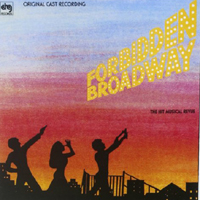 Original Cast, 1982 (DRG)
Original Cast, 1982 (DRG)  (3 / 5) Gerard Alessandrini’s revues lampooning Broadway hits and personalities have been a reliable source of merriment in cabaret rooms, Off-Broadway theaters, and other venues throughout the U.S. and abroad since the early 1980s. “Wicked” is the adjective most often applied to these knowing parodies of show tunes and celebrities, but there’s usually affection at their base. More than that, Alessandrini’s a talented lyricist in his own right, particularly adept at turning a well-known lyric or show title on its head with a subtle tweak — e.g., “I Wonder What the King Is Drinking Tonight,” “Into the Words,” “Rant.” And his revues have showcased some of New York’s brightest talents, young pros with great gifts for mimicry. Of course, there’s no way to duplicate the visual components that send audiences into uncontrollable laughter, such as the hilarious costumes (often by the legendary Alvin Colt) and tiny sets spoofing enormous ones. Since the FB cast recordings are essentially comedy albums and repeated listening can diminish the jokes, they may linger on your CD shelves for long intervals, but they’re fun to revisit as a reminder of the ridiculous foibles of a given season. This first Forbidden Broadway album is one of the best, though by far the shortest at 40 minutes. Alessandrini usually writes one entirely original title song for each edition of the show, and there’s a particularly apt one here, with lyrics such as: “There’s a Great White Way / Where the white is gray / And the great is only okay.” The writer himself is also in the cast, doing a killer Topol in “Ambition.” The invaluable Nora Mae Lyng is a brassy Ann Miller and a brassier Ethel Merman, future indie-film star Chloe Webb a pert Andrea McArdle, and Bill Carmichael a funny emcee announcing, “Hats off, here they come, those . . . bankable stars.” As always, the one-piano accompaniment (here by musical director Fred Barton) manages to sound like a whole orchestra. Subsequent FB albums are more complete and more nastily funny, but this one has a hottest-new-show-in-town oomph. It also has that great Merrily We Roll Along parody poster art on its cover.– Marc Miller
(3 / 5) Gerard Alessandrini’s revues lampooning Broadway hits and personalities have been a reliable source of merriment in cabaret rooms, Off-Broadway theaters, and other venues throughout the U.S. and abroad since the early 1980s. “Wicked” is the adjective most often applied to these knowing parodies of show tunes and celebrities, but there’s usually affection at their base. More than that, Alessandrini’s a talented lyricist in his own right, particularly adept at turning a well-known lyric or show title on its head with a subtle tweak — e.g., “I Wonder What the King Is Drinking Tonight,” “Into the Words,” “Rant.” And his revues have showcased some of New York’s brightest talents, young pros with great gifts for mimicry. Of course, there’s no way to duplicate the visual components that send audiences into uncontrollable laughter, such as the hilarious costumes (often by the legendary Alvin Colt) and tiny sets spoofing enormous ones. Since the FB cast recordings are essentially comedy albums and repeated listening can diminish the jokes, they may linger on your CD shelves for long intervals, but they’re fun to revisit as a reminder of the ridiculous foibles of a given season. This first Forbidden Broadway album is one of the best, though by far the shortest at 40 minutes. Alessandrini usually writes one entirely original title song for each edition of the show, and there’s a particularly apt one here, with lyrics such as: “There’s a Great White Way / Where the white is gray / And the great is only okay.” The writer himself is also in the cast, doing a killer Topol in “Ambition.” The invaluable Nora Mae Lyng is a brassy Ann Miller and a brassier Ethel Merman, future indie-film star Chloe Webb a pert Andrea McArdle, and Bill Carmichael a funny emcee announcing, “Hats off, here they come, those . . . bankable stars.” As always, the one-piano accompaniment (here by musical director Fred Barton) manages to sound like a whole orchestra. Subsequent FB albums are more complete and more nastily funny, but this one has a hottest-new-show-in-town oomph. It also has that great Merrily We Roll Along parody poster art on its cover.– Marc Miller
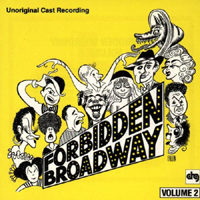 Forbidden Broadway: Volume 2 — Compilation Album, 1991 (DRG)
Forbidden Broadway: Volume 2 — Compilation Album, 1991 (DRG)  (3 / 5) For the best stuff in this compilation of Forbidden Broadway material from 1985 to 1991, check out Toni DiBuono capturing Patti LuPone down to the last self-indulgent nuance (“I Get a Kick Out of Me”), an ingenious My Fair Lady parody (“I Strain in Vain to Train Madonna’s Brain”) inspired by Madonna’s Broadway stint in Speed the Plow, Kevin Ligon as an amazing Mandy Patinkin (“Somewhat Overindulgent”), and one of the most famous and popular sequences in Forbidden Broadway history: the epic spoof of Les Misérables (“At the end of the play, you’re another year older.”) There are also winning performances by Michael McGrath and Karen Murphy. Not all of the tracks are for everybody; you have to have seen the original M. Butterfly, for instance, to appreciate the satiric puzzlement over its success. A backhanded salute to The Phantom of the Opera is a bit compromised because Andrew Lloyd Webber wouldn’t allow his music to be used without alteration, but the righteous indignation expressed over a relatively fallow era in Broadway musical history makes for a very entertaining hour-plus of listening. — M.M.
(3 / 5) For the best stuff in this compilation of Forbidden Broadway material from 1985 to 1991, check out Toni DiBuono capturing Patti LuPone down to the last self-indulgent nuance (“I Get a Kick Out of Me”), an ingenious My Fair Lady parody (“I Strain in Vain to Train Madonna’s Brain”) inspired by Madonna’s Broadway stint in Speed the Plow, Kevin Ligon as an amazing Mandy Patinkin (“Somewhat Overindulgent”), and one of the most famous and popular sequences in Forbidden Broadway history: the epic spoof of Les Misérables (“At the end of the play, you’re another year older.”) There are also winning performances by Michael McGrath and Karen Murphy. Not all of the tracks are for everybody; you have to have seen the original M. Butterfly, for instance, to appreciate the satiric puzzlement over its success. A backhanded salute to The Phantom of the Opera is a bit compromised because Andrew Lloyd Webber wouldn’t allow his music to be used without alteration, but the righteous indignation expressed over a relatively fallow era in Broadway musical history makes for a very entertaining hour-plus of listening. — M.M.
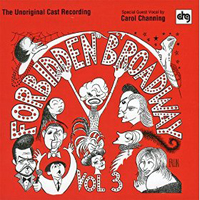 Forbidden Broadway: Volume 3, 1993 (DRG)
Forbidden Broadway: Volume 3, 1993 (DRG)  (2 / 5) This third edition’s opening number is weak, a CD-only appearance by Carol Channing and a stageful of imitators. But some first-class stuff follows: devastating slaps at Petula Clark and David Cassidy in Blood Brothers, Suzanne Blakeslee’s astonishing evocation of Julie Andrews, and Craig Wells’ hilarious put-down of Michael Crawford. On the whole, however, that season’s shows weren’t as ripe for parody as those of other seasons. Dustin Hoffman as Shylock filtered through Rain Man doesn’t hold up, and Topol’s stodginess in Fiddler was old news even in ’93; so was Robert Goulet’s Vegas slickness. Still, the intermittent pleasures keep coming, including quick riffs on the scenery chewing of Nathan Lane and Faith Prince in Guys and Dolls, a knockdown punch at Liliane Montevecchi, and an efficient torching of Miss Saigon. — M.M.
(2 / 5) This third edition’s opening number is weak, a CD-only appearance by Carol Channing and a stageful of imitators. But some first-class stuff follows: devastating slaps at Petula Clark and David Cassidy in Blood Brothers, Suzanne Blakeslee’s astonishing evocation of Julie Andrews, and Craig Wells’ hilarious put-down of Michael Crawford. On the whole, however, that season’s shows weren’t as ripe for parody as those of other seasons. Dustin Hoffman as Shylock filtered through Rain Man doesn’t hold up, and Topol’s stodginess in Fiddler was old news even in ’93; so was Robert Goulet’s Vegas slickness. Still, the intermittent pleasures keep coming, including quick riffs on the scenery chewing of Nathan Lane and Faith Prince in Guys and Dolls, a knockdown punch at Liliane Montevecchi, and an efficient torching of Miss Saigon. — M.M.
 Forbidden Broadway Strikes Back!, 1996 (DRG)
Forbidden Broadway Strikes Back!, 1996 (DRG)  (4 / 5) A luxurious 73 minutes of what might be Gerard Alessandrini’s most consistent bouquet of parodies, this edition benefits from top-flight talent. The opening number (“Parody Tonight”) serves up Tom Plotkin’s expert Nathan Lane, Christine Pedi’s gurgling Liza, Donna English’s sneering Zoe Caldwell, and Bryan Batt’s vapid John Davidson in State Fair beaming through “Oh, What a Beautiful Moron!” It’s an auspicious start, and the recording seldom flags from there. There are digs at Harold Prince’s enormous Show Boat, the failed promise of Big, and casting prospects for the upcoming Kiss Me, Kate revival (Pedi’s Bernadette Peters and Batt’s Mandy Patinkin duet in “So Miscast”). English does the best Julie Andrews you’ve ever heard in an extended pummeling of Victor/Victoria (with the Tony nominating committee warbling, “Victor/Victoria, we will ignore-ee-ya”), and a brilliant parody of Rent encapsulates the frustrations of that show’s dissenters. Even the arrangements are funny; listen to the Sondheimisms in the King and I send-up. The album is a hoot, and there’s a terrific bonus track: English as Julie again, in a parody of Star! that’s truly hilarious. — M.M.
(4 / 5) A luxurious 73 minutes of what might be Gerard Alessandrini’s most consistent bouquet of parodies, this edition benefits from top-flight talent. The opening number (“Parody Tonight”) serves up Tom Plotkin’s expert Nathan Lane, Christine Pedi’s gurgling Liza, Donna English’s sneering Zoe Caldwell, and Bryan Batt’s vapid John Davidson in State Fair beaming through “Oh, What a Beautiful Moron!” It’s an auspicious start, and the recording seldom flags from there. There are digs at Harold Prince’s enormous Show Boat, the failed promise of Big, and casting prospects for the upcoming Kiss Me, Kate revival (Pedi’s Bernadette Peters and Batt’s Mandy Patinkin duet in “So Miscast”). English does the best Julie Andrews you’ve ever heard in an extended pummeling of Victor/Victoria (with the Tony nominating committee warbling, “Victor/Victoria, we will ignore-ee-ya”), and a brilliant parody of Rent encapsulates the frustrations of that show’s dissenters. Even the arrangements are funny; listen to the Sondheimisms in the King and I send-up. The album is a hoot, and there’s a terrific bonus track: English as Julie again, in a parody of Star! that’s truly hilarious. — M.M.
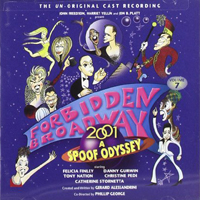 Forbidden Broadway 2001: A Spoof Odyssey, 2000 (DRG)
Forbidden Broadway 2001: A Spoof Odyssey, 2000 (DRG)  (3 / 5) This edition averages out slightly below the series’ general level of inspiration. The first few tracks evaporate, and we don’t get a direct hit until the disembowelment of The Music Man, featuring a very funny Danny Gurwin. Other choice bits: a number that deals with Disney’s downsizing of Beauty and the Beast; Christine Pedi’s slaughtering of Liza Minnelli, not to mention her uncanny turns as Patti LuPone and Gwen Verdon; and an extended riff on Aida that will tickle even those unfamiliar with the show. Alessandrini’s take on Cheryl Ladd in Annie Get Your Gun (“I’ve No Business in Show Business”) epitomizes his art, and Tony Nation’s spoof of James Carpinello in Saturday Night Fever (“Stayin’ Away”) is a deft shot at an easy target, but the digs at Sondheim and Streisand don’t land as smoothly as usual. The album sends customers out on a high note with “76 Hit Shows,” but there wasn’t much to celebrate on Broadway in 2000, so it seems disingenuous to pretend that there was. — M.M.
(3 / 5) This edition averages out slightly below the series’ general level of inspiration. The first few tracks evaporate, and we don’t get a direct hit until the disembowelment of The Music Man, featuring a very funny Danny Gurwin. Other choice bits: a number that deals with Disney’s downsizing of Beauty and the Beast; Christine Pedi’s slaughtering of Liza Minnelli, not to mention her uncanny turns as Patti LuPone and Gwen Verdon; and an extended riff on Aida that will tickle even those unfamiliar with the show. Alessandrini’s take on Cheryl Ladd in Annie Get Your Gun (“I’ve No Business in Show Business”) epitomizes his art, and Tony Nation’s spoof of James Carpinello in Saturday Night Fever (“Stayin’ Away”) is a deft shot at an easy target, but the digs at Sondheim and Streisand don’t land as smoothly as usual. The album sends customers out on a high note with “76 Hit Shows,” but there wasn’t much to celebrate on Broadway in 2000, so it seems disingenuous to pretend that there was. — M.M.
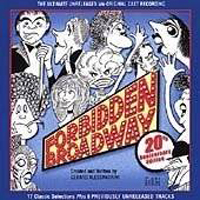 20th Anniversary Edition — Compilation Album, 2000 (DRG)
20th Anniversary Edition — Compilation Album, 2000 (DRG)  (4 / 5) If you’re not a Forbidden Broadway completist but want to know what all the fuss is about, this compilation, featuring eight previously unreleased tracks, is just the thing. Both the strengths and occasional weaknesses of the format come through ringingly, and the prodigiously talented cast offers more variety than a single-edition album would. Not all the spoofs are top-drawer; that Carol Channing parody really should be retired. What a pleasure, though, to re-encounter Christine Pedi’s flawless invocations of Liza and Stritch, Toni DiBuono’s uncanny Patti LuPone, and Alessandrini’s particular distaste for Broadway Disneyfication. Among the bonus tracks are some of his very best vignettes, such as Terri White’s glorious “Screamgirls” and the total demolition of Aspects of Love (“Love Changes Everything” becomes “I Sleep With Everyone”). Note how the various musical directors/accompanists throughout the history of Forbidden Broadway express entire orchestrations with one piano. Note also how they exaggerate cast album affectations — languorous tempi for Les Miz, the heavy bass tread of a Rodgers 4/4 tempo–to great effect. — M.M.
(4 / 5) If you’re not a Forbidden Broadway completist but want to know what all the fuss is about, this compilation, featuring eight previously unreleased tracks, is just the thing. Both the strengths and occasional weaknesses of the format come through ringingly, and the prodigiously talented cast offers more variety than a single-edition album would. Not all the spoofs are top-drawer; that Carol Channing parody really should be retired. What a pleasure, though, to re-encounter Christine Pedi’s flawless invocations of Liza and Stritch, Toni DiBuono’s uncanny Patti LuPone, and Alessandrini’s particular distaste for Broadway Disneyfication. Among the bonus tracks are some of his very best vignettes, such as Terri White’s glorious “Screamgirls” and the total demolition of Aspects of Love (“Love Changes Everything” becomes “I Sleep With Everyone”). Note how the various musical directors/accompanists throughout the history of Forbidden Broadway express entire orchestrations with one piano. Note also how they exaggerate cast album affectations — languorous tempi for Les Miz, the heavy bass tread of a Rodgers 4/4 tempo–to great effect. — M.M.
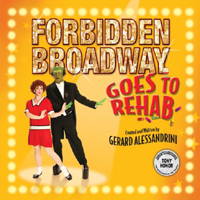 Forbidden Broadway Goes to Rehab, 2009 (DRG)
Forbidden Broadway Goes to Rehab, 2009 (DRG)  (3 / 5) This wasn’t one of the more thrilling Broadway seasons to spoof, but Alessandrini did a workmanlike job of finding targets, and in some cases, much better than workmanlike. Gina Kreiezmar doesn’t sound a great deal like Ashley Brown, but her “Feed the Burbs,” mocking Mary Poppins, is Alessandrini’s most concise and hilarious skewering of the Disneyfication of Broadway. Christina Bianco’s vocally challenged Bernadette Peters, in “See Me on a Monday” (one of several bonus tracks), is mean in a very funny way. Some straight-play parodies, of August: Osage County and Daniel Radcliffe in Equus (with James Donegan as Radcliffe), get the job done. Michael West is a delectably overblown James Barbour in a Tale of Two Cities spoof, and a number in which Kreiezmar as Patti LuPone taunts West as Boyd Gaines with “Small Part, Isn’t It?” is deftly done. — M.M.
(3 / 5) This wasn’t one of the more thrilling Broadway seasons to spoof, but Alessandrini did a workmanlike job of finding targets, and in some cases, much better than workmanlike. Gina Kreiezmar doesn’t sound a great deal like Ashley Brown, but her “Feed the Burbs,” mocking Mary Poppins, is Alessandrini’s most concise and hilarious skewering of the Disneyfication of Broadway. Christina Bianco’s vocally challenged Bernadette Peters, in “See Me on a Monday” (one of several bonus tracks), is mean in a very funny way. Some straight-play parodies, of August: Osage County and Daniel Radcliffe in Equus (with James Donegan as Radcliffe), get the job done. Michael West is a delectably overblown James Barbour in a Tale of Two Cities spoof, and a number in which Kreiezmar as Patti LuPone taunts West as Boyd Gaines with “Small Part, Isn’t It?” is deftly done. — M.M.


